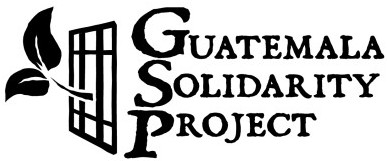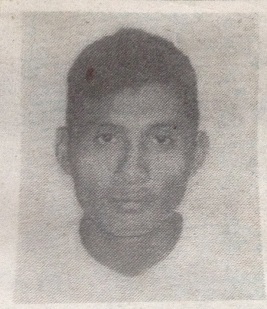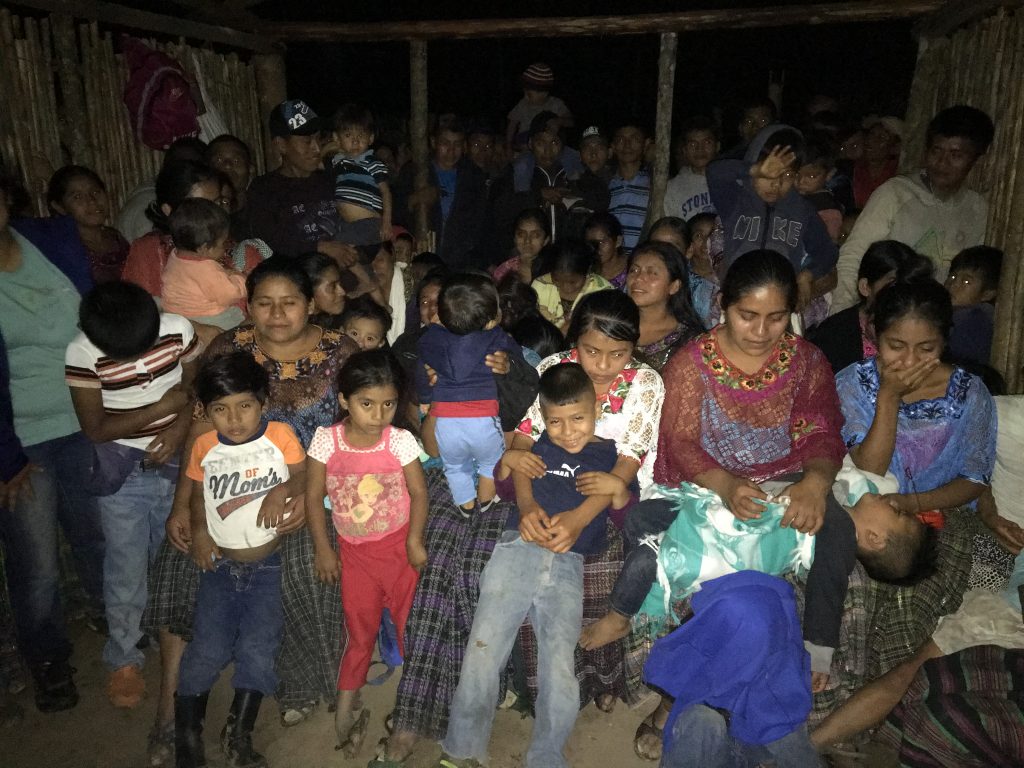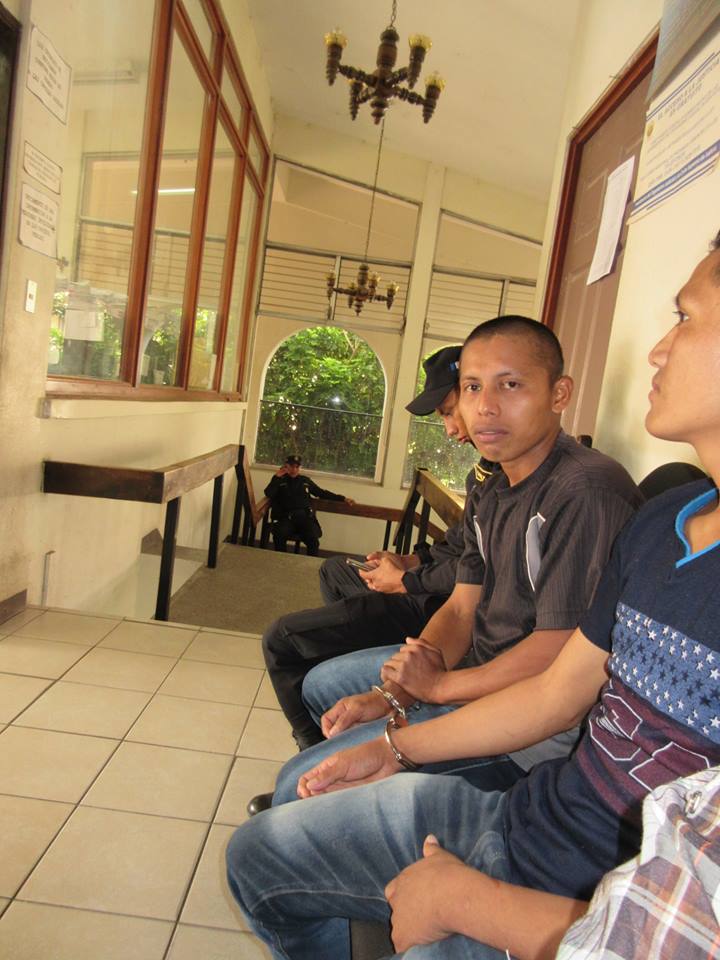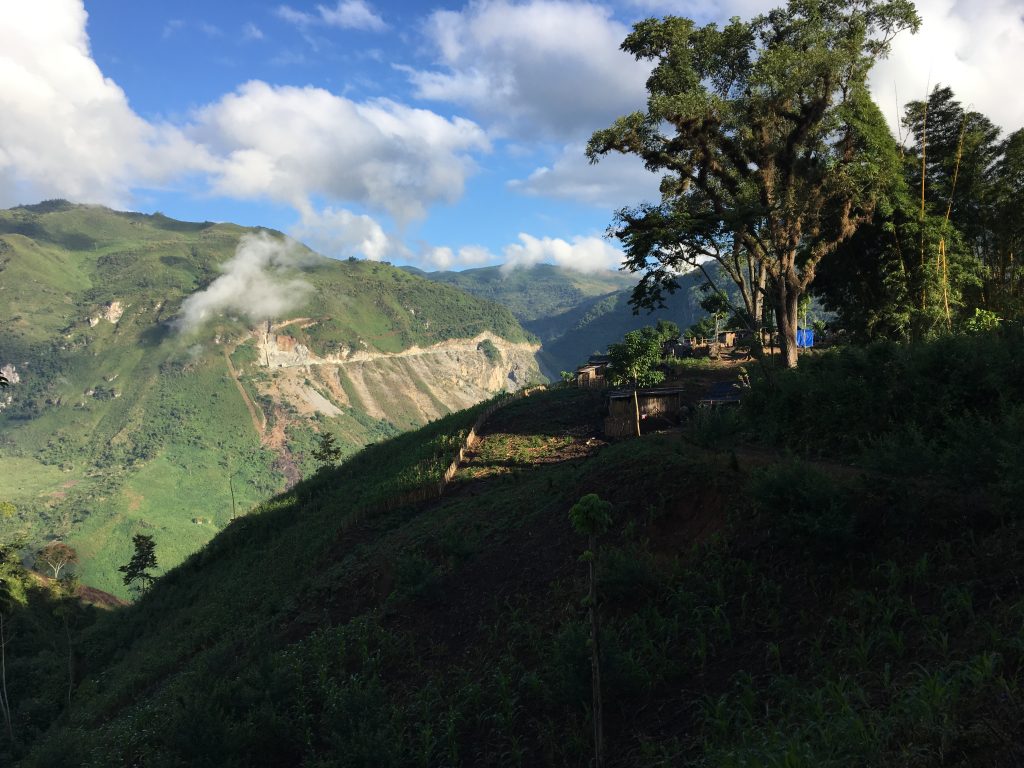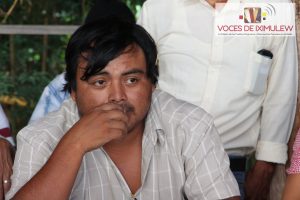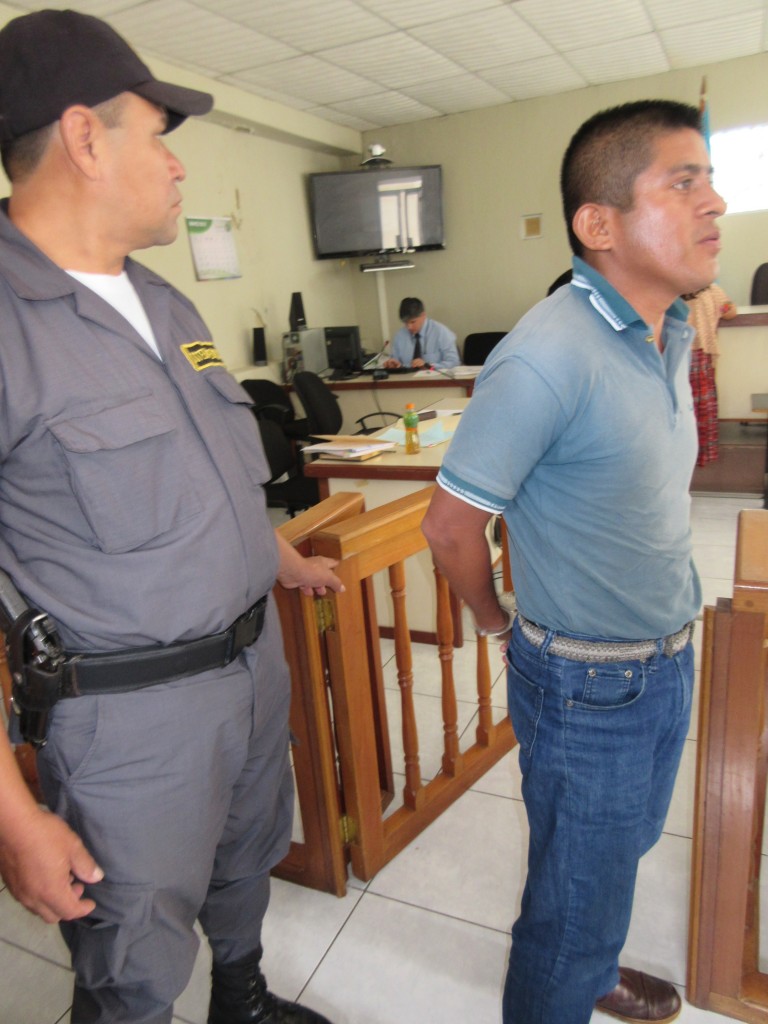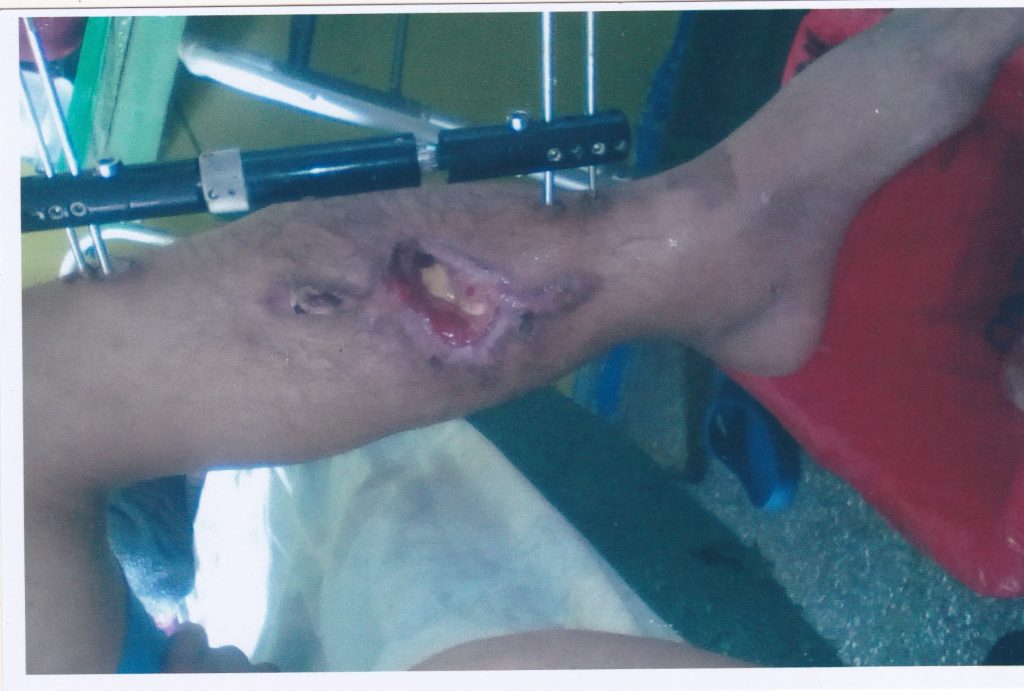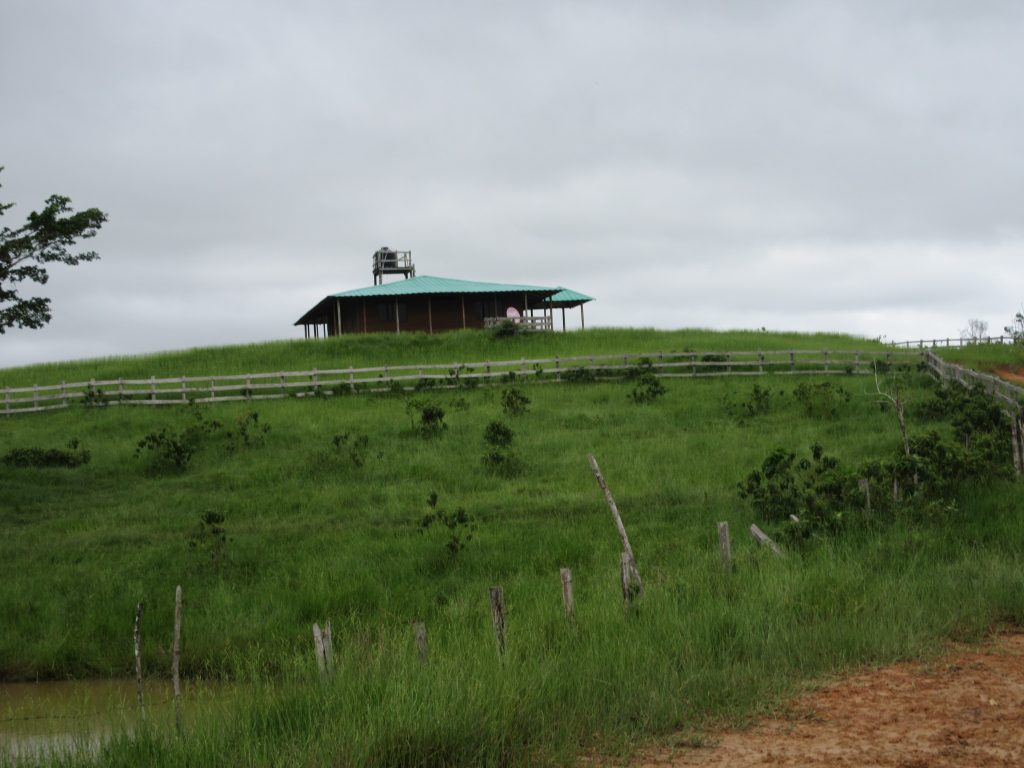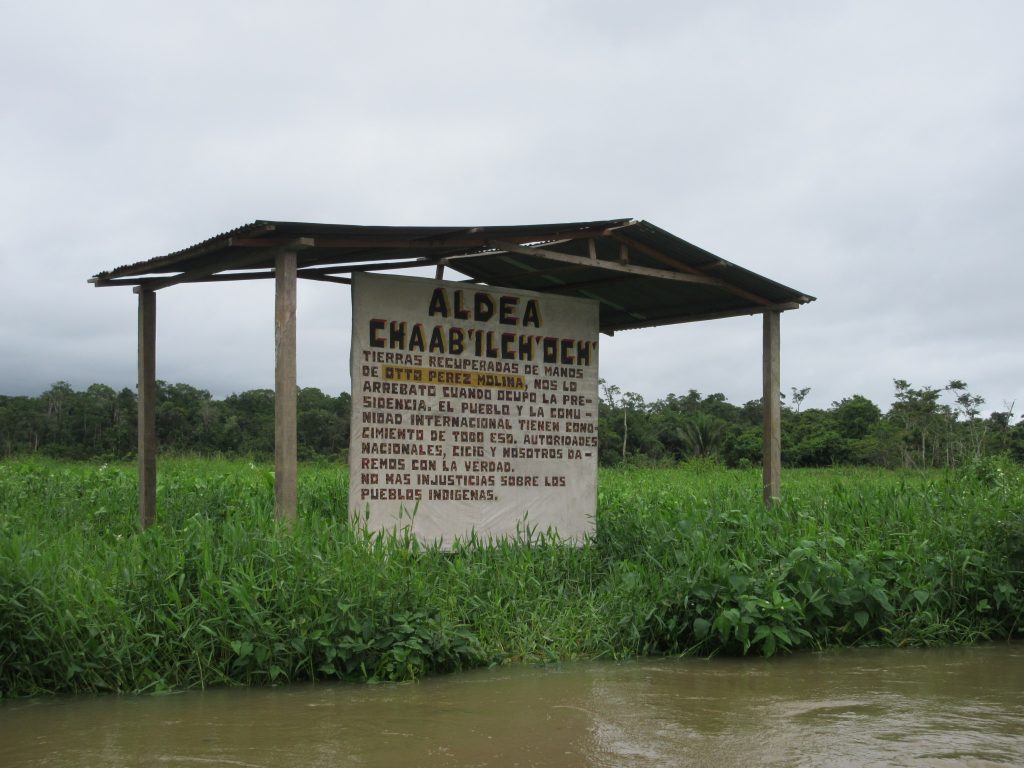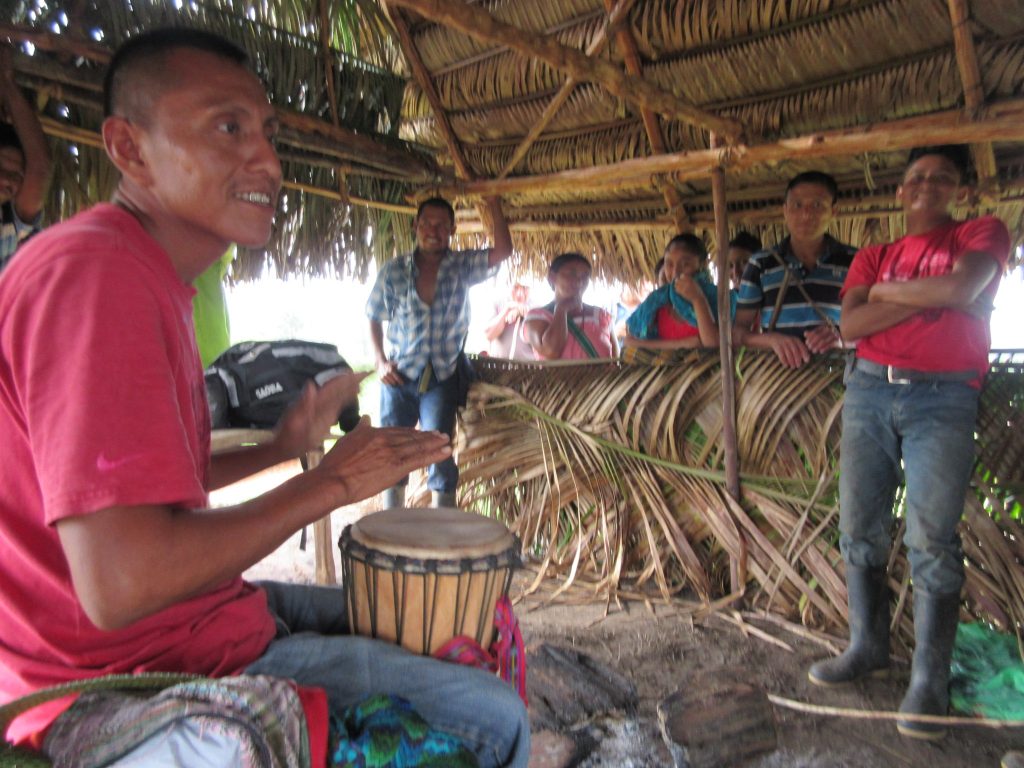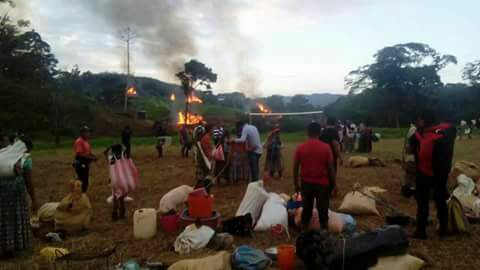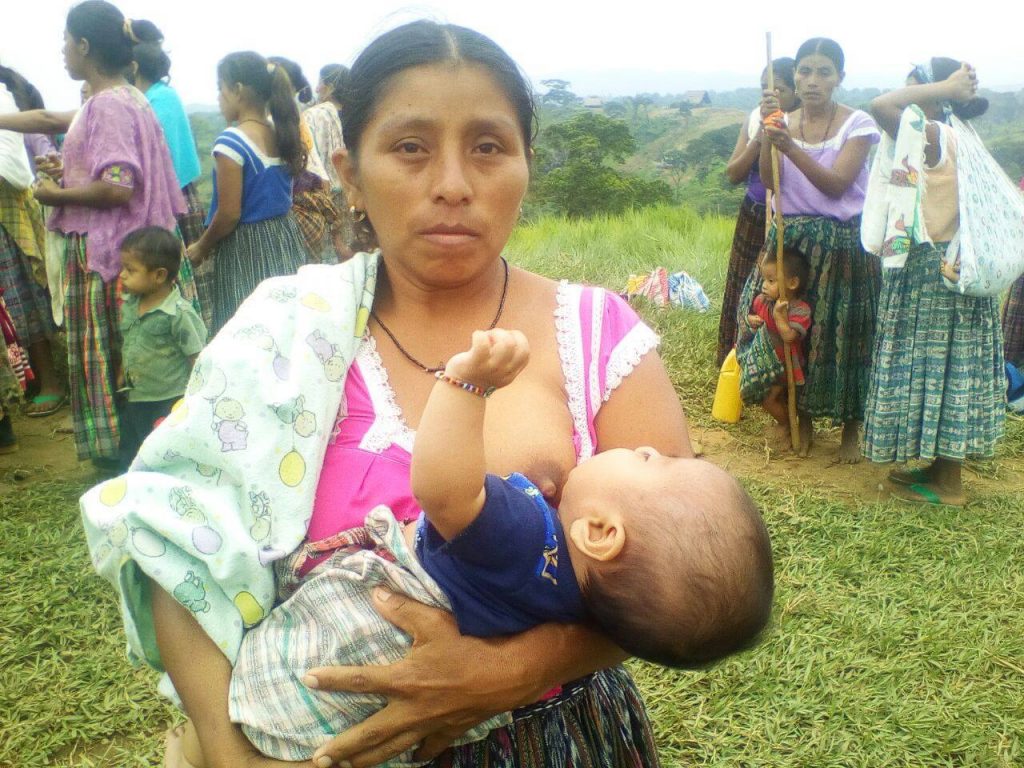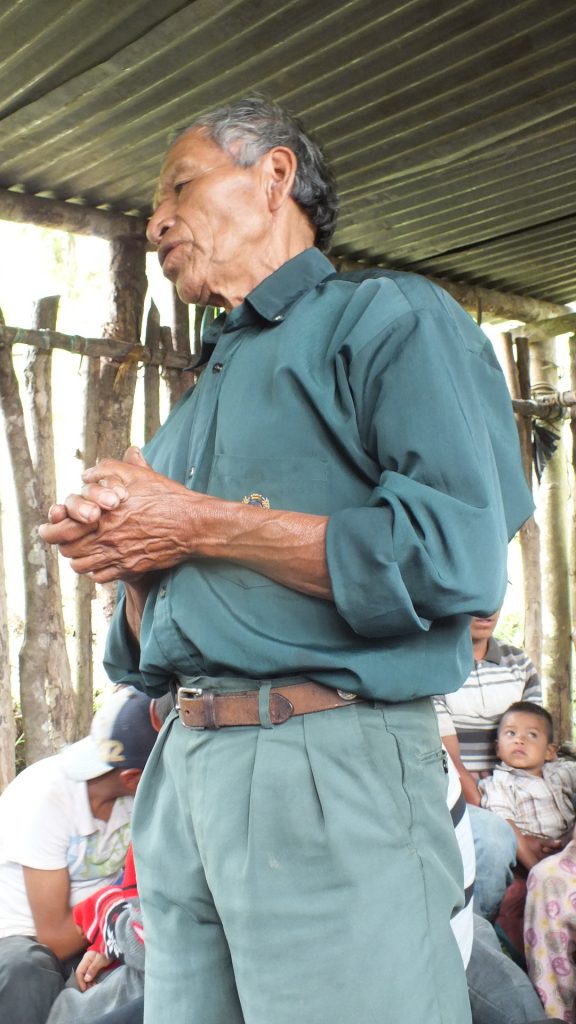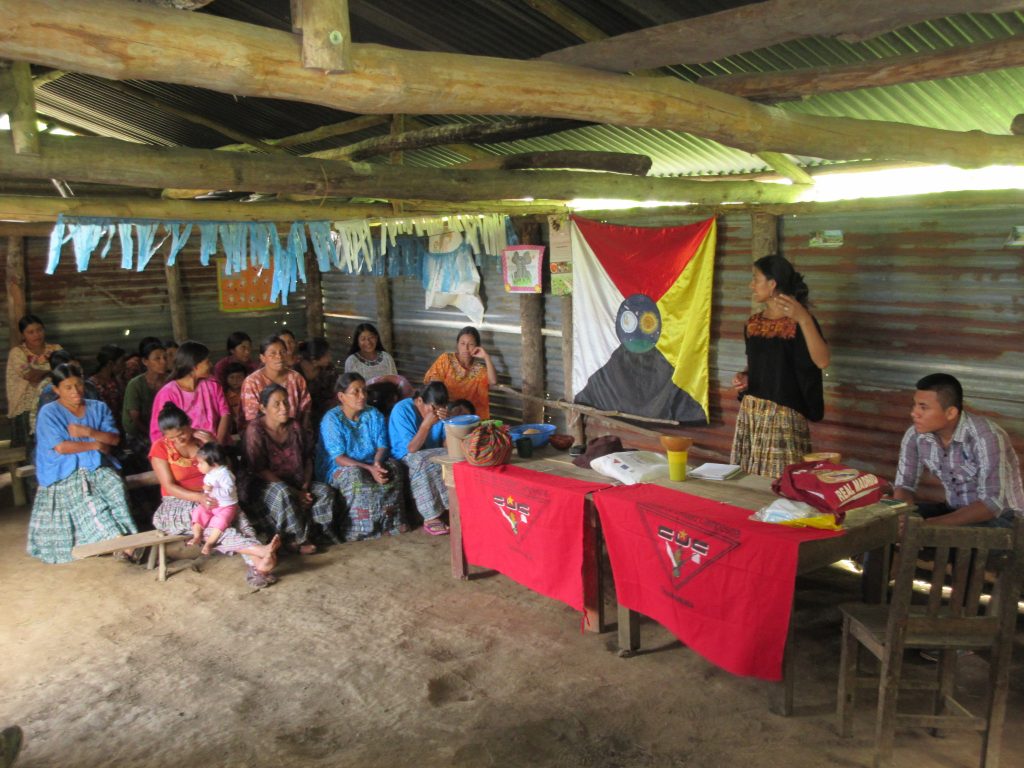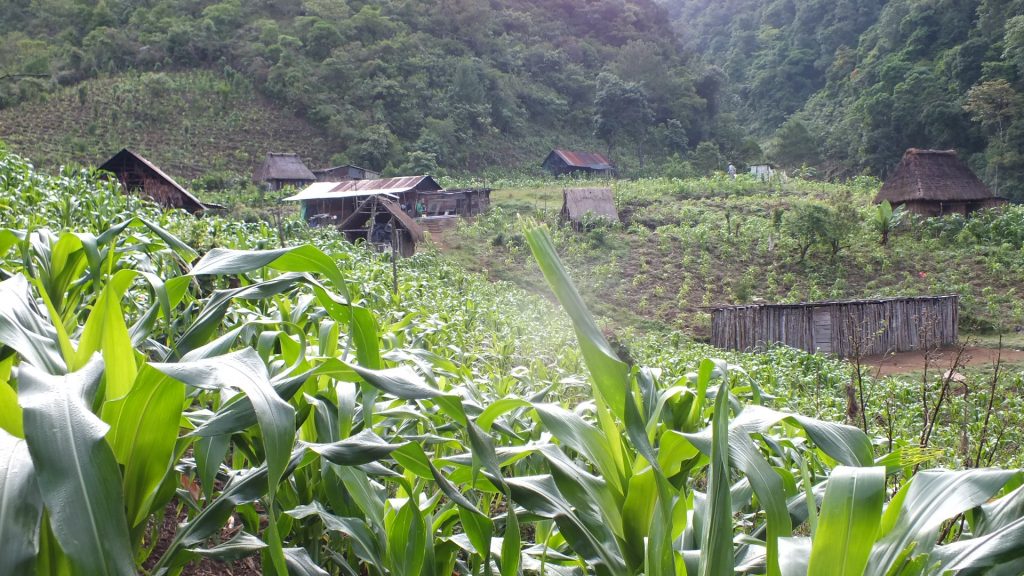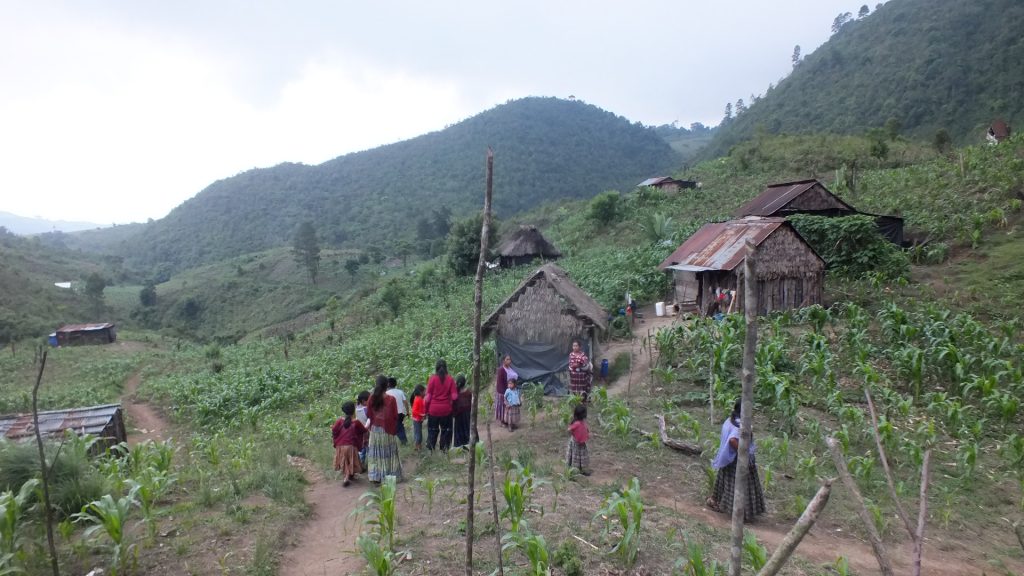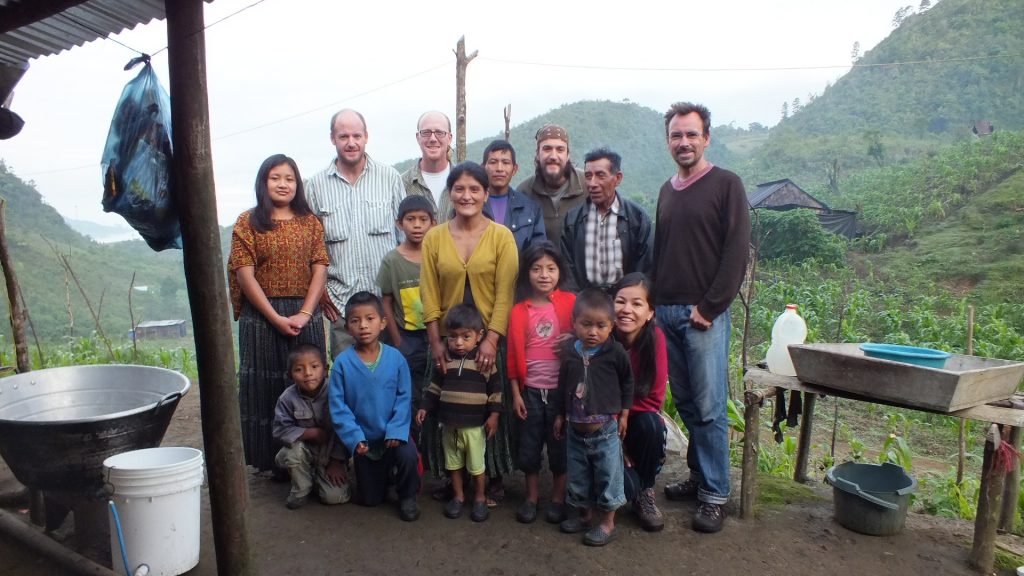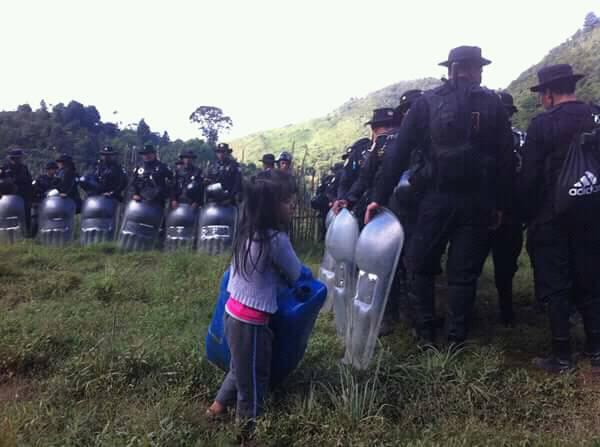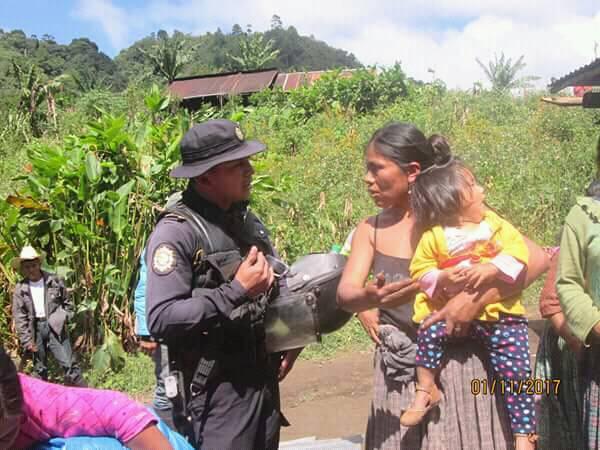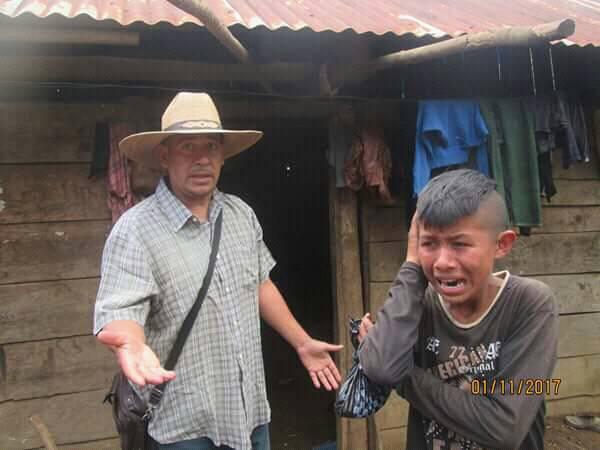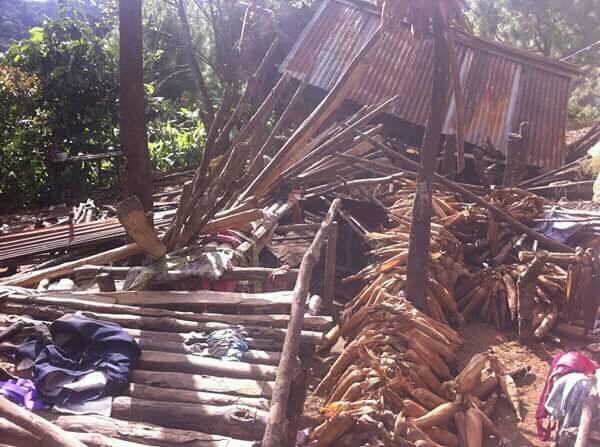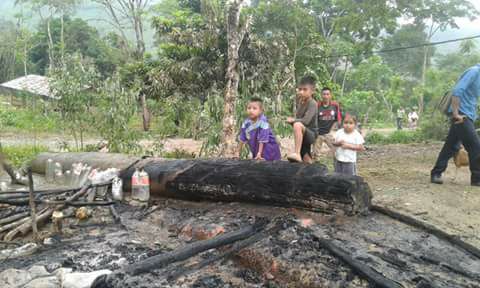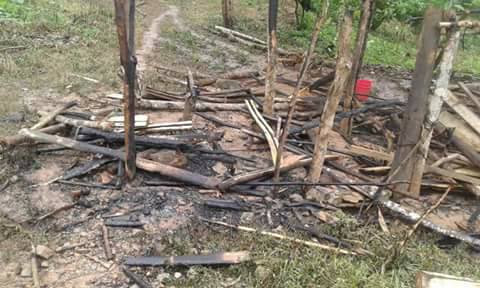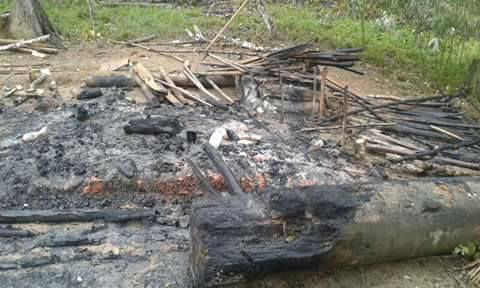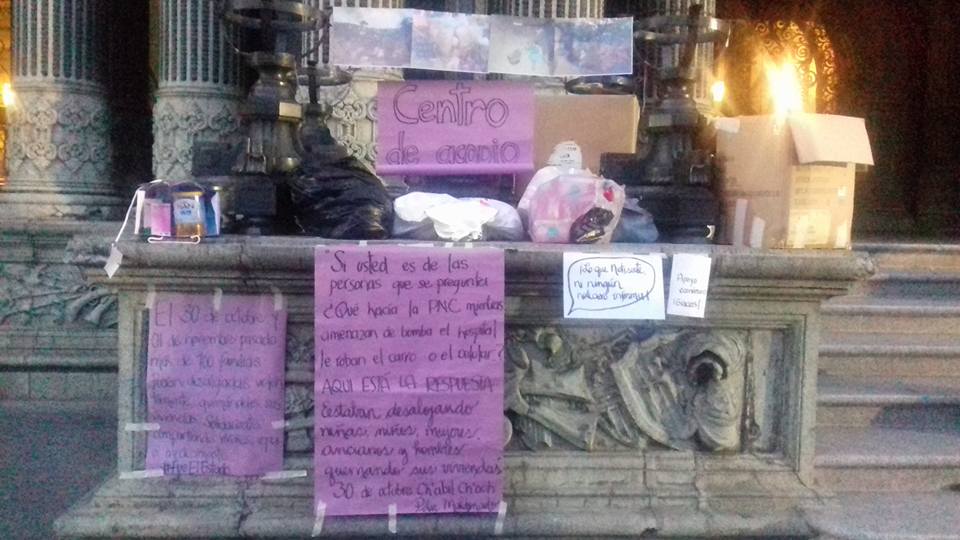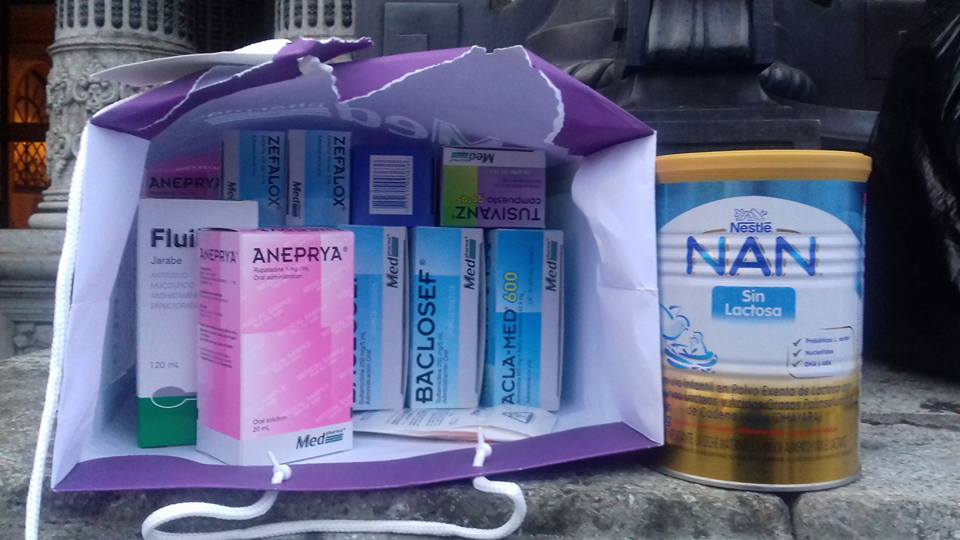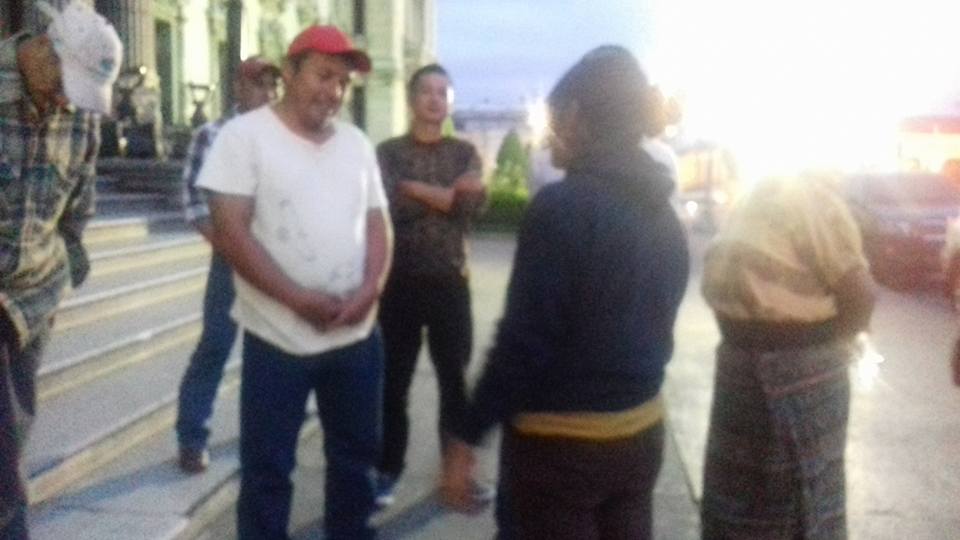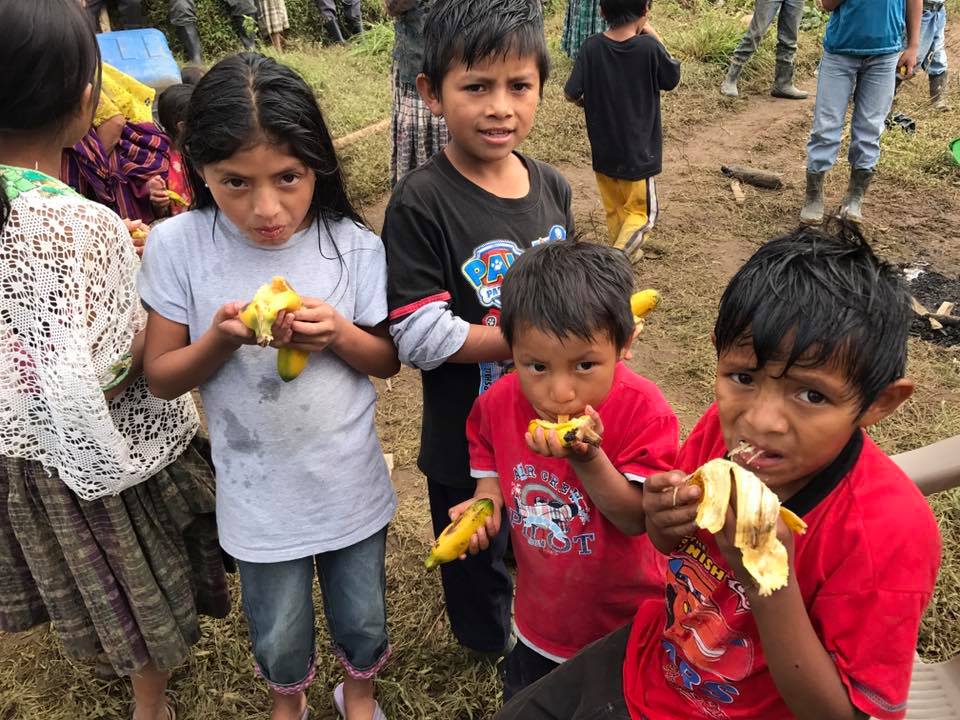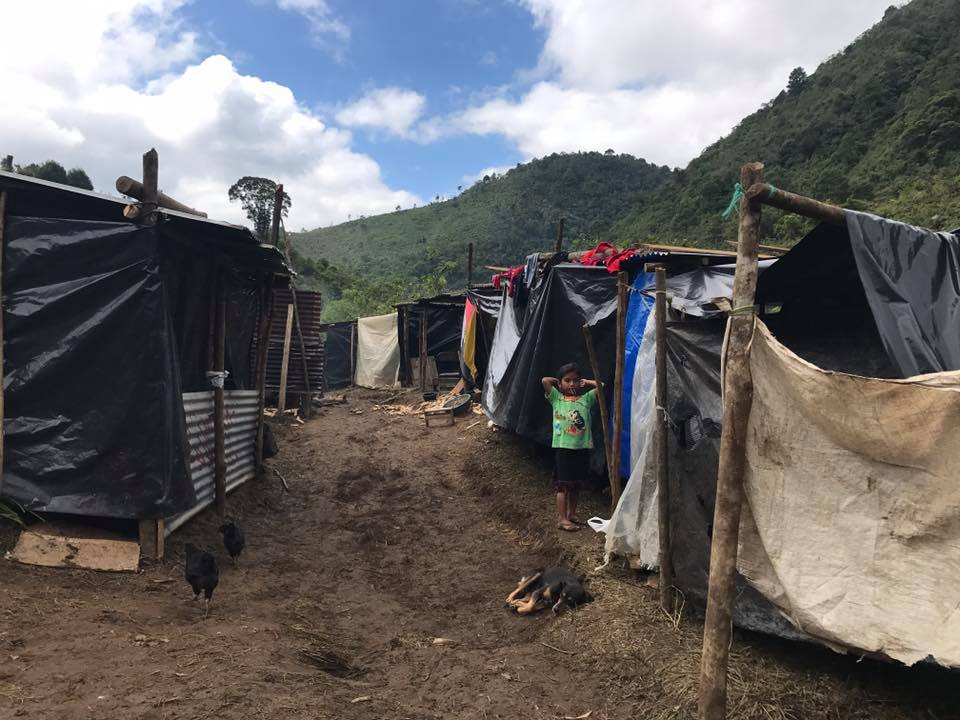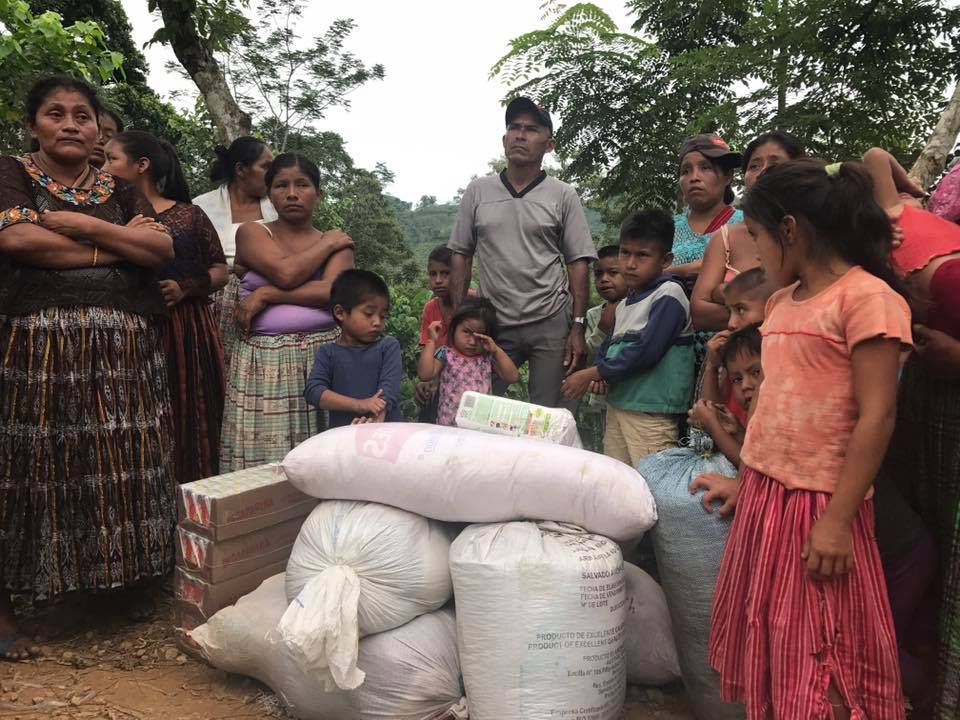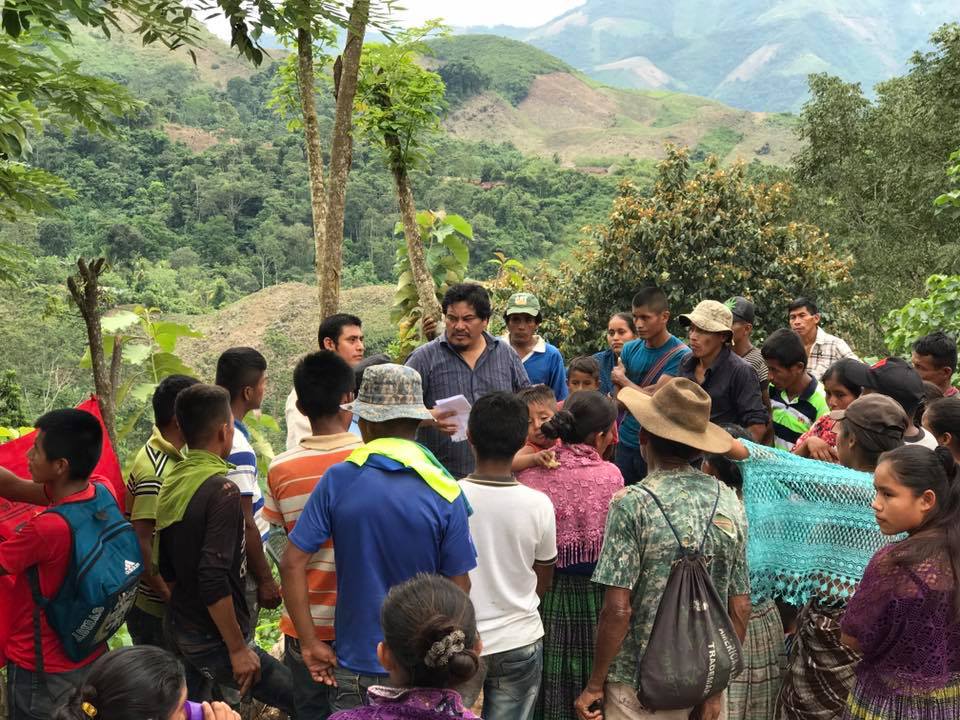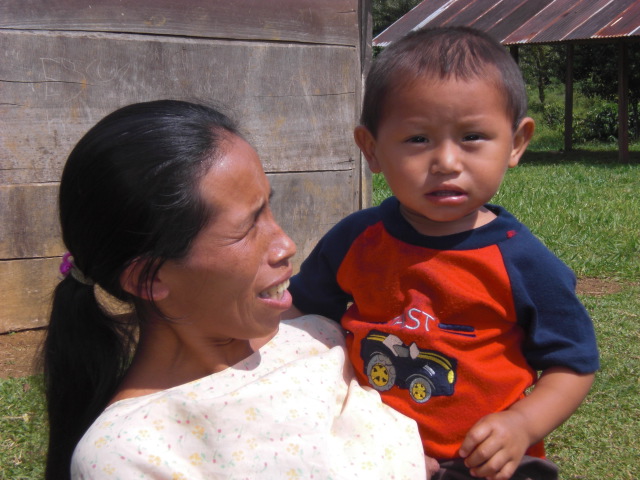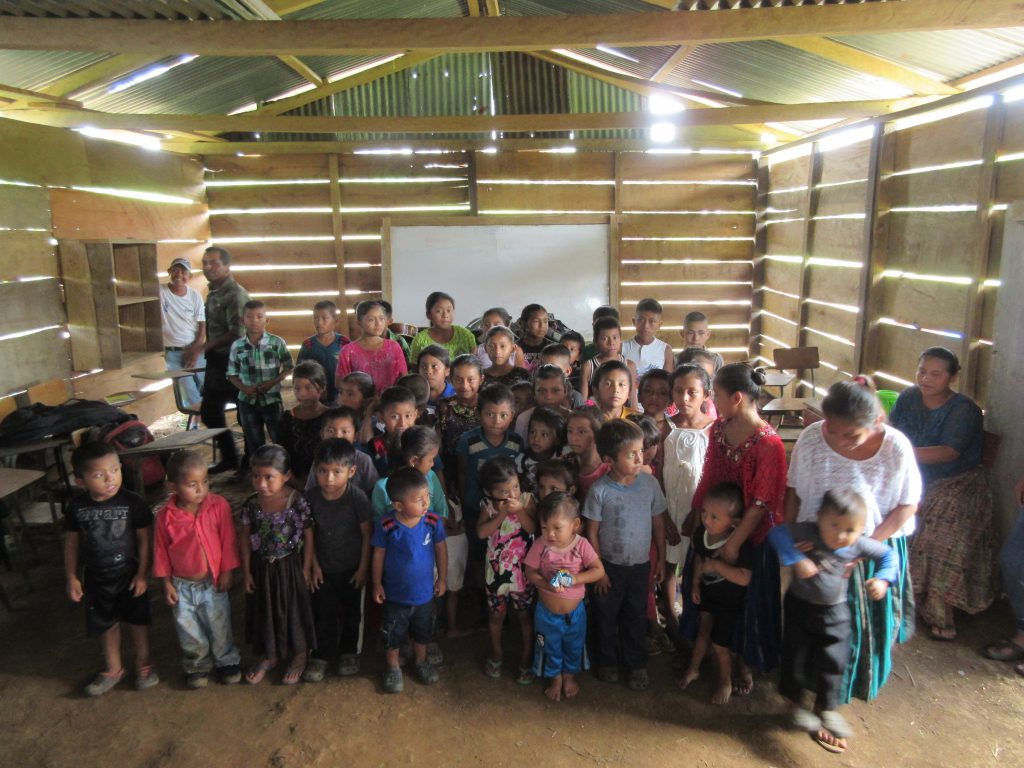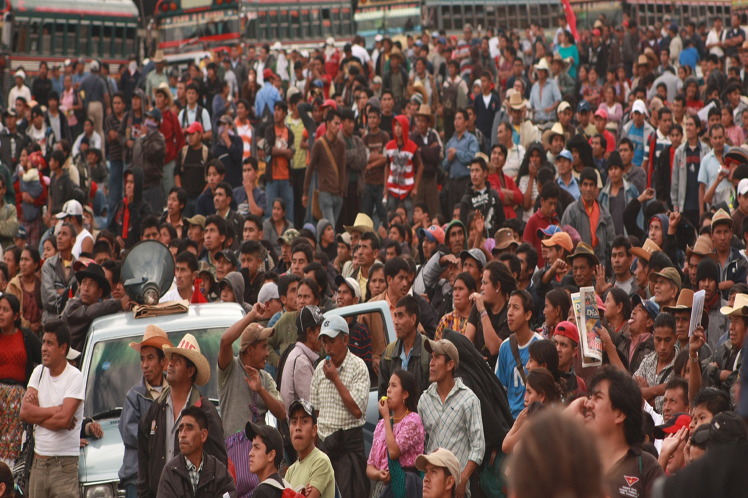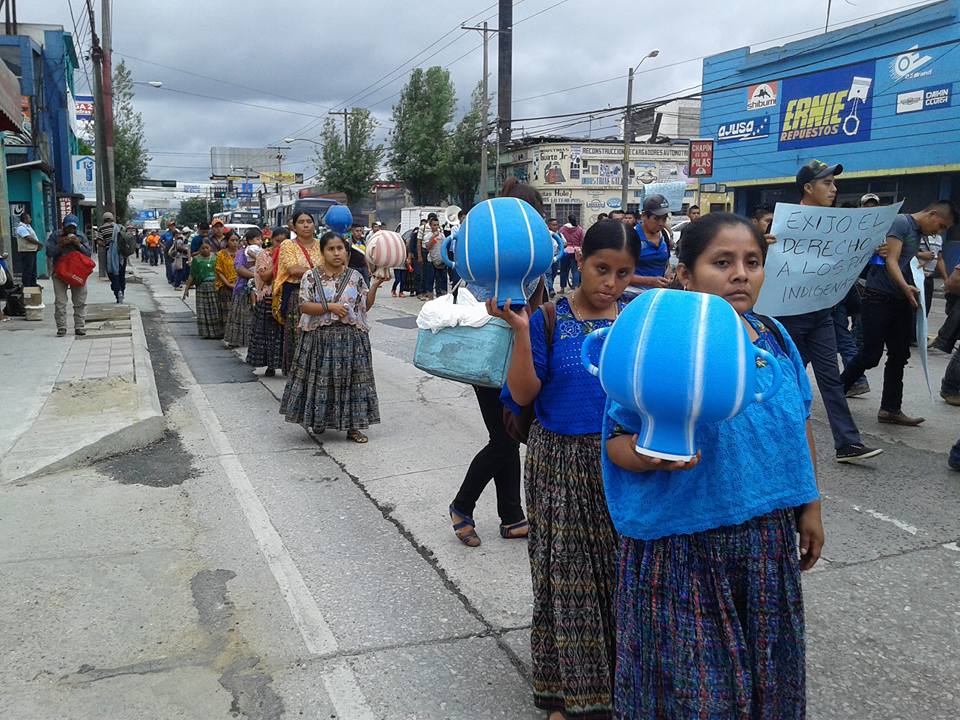Urgent: Q’eqchi’ leader Bernardo Caal Sentenced to Seven Years in Prison
11/9/18
GuatemalaSolidarityProject.org
“We have to continue the struggle, we can not be intimidated by prison”
– Bernardo Caal, after being sentenced to seven years, four months in prison earlier today
The Guatemala Solidarity Project condemns today’s seven year, four month prison sentence given to indigenous Q’eqchi’ leader Bernardo Caal. Caal was arrested on January 30 after years of nonviolent organizing in defense of indigenous rights, culture and territory. The sentence came weeks after President Jimmy Morales used donated US military vehicles as part of an effort to expel members of the United Nations International Commission Against Impunity in Guatemala (CICIG), which had just requested the impeachment of the President for corruption.
Caal has been a central target of the Guatemalan government because of his leadership in opposition to the Oxec and Oxec II hydroelectric dams. The dams were illegally built without consulting indigenous Q’eqchi’ communities in the region, as is required by law. The Oxec river had provided many of these communities with water and fish, and was a foundation of one of the most biodiverse region’s on earth. The river also has strong spiritual significance among indigenous people in Guatemala, and is named in ancient creation and cosmology narratives as one of the locations of the creation of living beings.
The construction of the hydroelectric dams is part of an escalation in the looting of indigenous territory being supported by multinational corporations and US military “aid.” At the same time, indigenous people, environmentalists, unions and other members of civil society have won major victories in recent years. This has included the arrest of three of Guatemala’s four previous president’s, and dozens of referendums rejecting mining, hydroelectric and other resource extraction projects in indigenous territory. CICIG has played a key role in bringing accountability to presidents and many other high ranking government officials. CICIG is currently under attack by President Morales and US politicians such as Senator Marco Rubio.
After being sentenced, Caal stood and addressed his supporters in the courtroom. “Take care of yourselves, I say goodbye with my head held high, I have not committed any crime. It is the businesses that have taken over and that is why they are sentencing me to prison. And I will be there in prison. Some day I am going to leave. Nelson Mandela was in prison for 27 years and he gave an example to his people. We have more than 500 years resisting, opposing these businesses that dispossess and we are going to continue. Dear people who accompany me, who struggle, who hear me, we have to continue fighting corruption, denouncing corruption until victory always. We have to keep fighting so that CICIG continues in Guatemala and installs an office here in Alta Verapaz because Alta Verapaz is one of the departments that heads the corruption.”
Caal had been in prison since January 30. He was convicted on obviously invented charges of armed robbery and illegal detention after an absurd trial in which members of the press and even his own legal time were frequently barred from hearings, and prosecution witnesses who had never even met Caal gave conflicting testimony about the alleged crimes.
Caal has faced repeated death threats in prison, but has continued to write public letters in support of other political prisoners and communities being targeted by government and corporate violence.
TAKE ACTION:
1) Sign the petition to free Bernardo Caal
2) Consider donating to the GSP. We are a volunteer run organization, and all funds go to our partners in Guatemala. Our partners determine our funding priorities, including school construction, water filters, support for political prisoners and more. We are committed to visiting political prisoners at least once a month and supporting basic needs such as food, medicine and clothing. Donate via our website or write a check to “UPAVIM” and mail it to UPAVIM, PO Box 63 Marshfield, VT, 05658. (UPAVIM is our 501c3 US tax deductible nonprofit, and also a volunteer run organization that helps us ensure all funds go to our partners)
3) If you are in the US, call your member of congress to ask them to support CICIG, oppose US backing of Guatemala’s military and inform them of Caal’s sentence. Sample script: “Hello my name is _______ and I am a constituent. I am calling regarding today’s seven year sentence given to indigenous leader Bernardo Caal in Guatemala. He was sentenced to prison for courageously speaking out against the repression of indigenous communities in Guatemala. His prison sentence is continued evidence that the US should continue to support CICIG, the UN International Commission Against Impunity in Guatemala, and stop supporting the US military. Please let me know if your office supports CICIG and opposes US backing of the Guatemalan military.”
Urgent: Adolfo Ichich Chom Murdered in Attack on Indigenous Poqomchi’ Community Dos Fuentes
July 24, 2018
The GSP is calling for solidarity with the family of Adolfo Ichich Chom and with indigenous communities targeted by the government and private security forces after Ichich was murdered on July 20. The murder was carried out by private security and employees of the business Agropecuaria Pananish during an attack on the community Dos Fuentes. One other member of the community was seriously injured. The majority of the community’s corn and beans were also destroyed, provoking fears of extreme hunger or starvation in the coming months.
Dos Fuentes community members meet with the GSP earlier this year
2) If you are in the US, contact your US House Representative. Suggested message: “My name is ____ and I am a constituent. I am extremely concerned about violent repression of indigenous communities and theft of natural resources in indigenous territory in Guatemalan. I would like your office to contact your liaison to the US State Department and express concern regarding the July 20 murder of Adolfo Ichich Chom of the community Dos Fuentes in Purulha, Baja Verapaz, Guatemala. The entire community of Dos Fuentes, as well as communities in the area, are facing threats of violence from the government and private businesses. I would like your office to ask the liaison to report on what, if anything, the US is doing to work with the Guatemalan government to prevent the continuation of violence against Dos Fuentes and surrounding communities.”
Background note: On May 21, 2018, the US Embassy released a press statement calling for “a stable climate of investment… to develop Guatemala’s abundant natural resources.” Violence and judicial repression are being used to steal these abundant natural resources from indigenous communities and it is important that members of congress who oppose this speak out.
Urgent: Human Rights and Water Defender Jose Cacao Arrested in Guatemala with 8-Year-Old Son as New Attorney General Continues Systematic Judicial Repression of Indigenous Activists
(July 1, 2018 update: Thanks in part to our supporters, Jose Cacao is free! In the meantime, please sign the petition calling for the release of political prisoner Bernardo Caal Xol)
June 10, 2018
Indigenous peasant leader Jose Cacao was arrested today along with his 8-year-old son in the municipality of Purulha in Baja Verapaz, Guatemala. Cacao is one of hundreds, if not thousands, of indigenous activists in the Verapaces region of Guatemala targeted by the government with fraudulent arrest warrants in attempts to end their nonviolent organizing in defense of indigenous rights and local ecosystems. Cacao’s young son was released from prison later in the day and is receiving support to recover from the traumatic event. Cacao remains in prison and the GSP needs your support to get him out.
Jose Cacao is from the community Dos Fuentes of the microregion Panima in Purulha. The microregion of Panima has been targeted by multinational corporations and banks for the large-scale theft of water. Indigenous communities are organizing nonviolently to stop this illegal theft; the government has responded by building a new military base in the region and issuing arrest warrants on invented charges against community leaders in the region.
On May 7, 2018, Dos Fuentes community leader Moises Maas Tut was also arrested on fraudulent charges. In part because of GSP activists and donors, he was released from prison on May 22 after two horrible weeks in the crowded Salama prison.
On May 17, 2018, María Consuelo Porras Argueta was sworn in as Guatemala’s new Attorney General after promising to fight rampant corruption in the country. However, Public Prosecutor’s continue to work in tandem with private companies to repress indigenous communities and steal natural resources from indigenous territory. While Jose Cacao and his 8-year-old son were arrested for the “crime” of nonviolent organizing, Public Prosecutor’s have issued no arrest warrants after the recent murders of peasant and indigenous activists Luis Arturo Marroquin, Jose Can Xol, Mateo Chaman Paau, Ramon Choc Sacrab, Florencio Perez Najera and Alejandro Hernandez Garcia.
The GSP will be sharing more information about this situation in the coming weeks. Meanwhile we are urgently organizing on the ground with our partners, and we need your solidarity!
TAKE ACTION
Suggested Actions:
****
If you are in the US, call your US House representative and ask them to sign on to the letter from Rep. Hank Johnson´s office which is directed to US Ambassador to Guatemala Luis Arreaga and requests that new Attorney General María Consuelo Porras Argueta de Porres end wrongful prosecution, sanction prosecutors who engage in it, prosecute corruption in the justice system, protect land rights of small farming and indigenous communities, and prosecute human rights violators. Please call your member of congress and ask to speak to a legislative aide who works in foreign policy. After requesting they sign on to the letter, ask for their email address so that you can send a follow up email. Please cc us in this email so that we can confirm if they sign the letter or not.
****
Make a donation of any size and all funds will go to our partners in Guatemala! Jose Cacao urgently needs food and legal support. We believe that we can get him out of prison soon, but only with your support! We thank our fiscal sponsor the UPAVIM Community Development
Foundation, a US tax-deductible 501c3 nonprofit organization, for helping us ensure that all funds go to our partners. To donate via check please make a check out to “UPAVIM” and mail to UPAVIM, PO Box 63, Marshfield, VT 05658. Please write “GSP” in the notes/memo section of the check. You can also donate via our website. Our partners determine funding priorities. Current urgent needs for donations include support for political prisoners, medical and other support for communities attacked by government and private security forces, and support for filing legal motions to prevent violent “evictions” of indigenous communities.
Take Action NOW to Free Q’eqchi’ Political Prisoner Abelino Chub!
April 19, 2018 update: Disgusting but not surprising outcome of today’s hearing that SHOULD HAVE led to Abelino’s freedom after over a year in prison… the hearing was postponed because the representative of the business making fraudulent accusations against him sent in a doctor’s note saying that he was sick and couldn’t attend. So Abelino will remain in prison, despite the fact that EVEN THE PROSECUTION HAS SAID THERE IS NO EVIDENCE AGAINST HIM AND HE SHOULD BE RELEASED. Please join our urgent action list by sending an email with the subject “Add to Action Alert List” to info@guatemalasolidarityproject.org in order to receive updates on future actions in support of freedom for Abelino Chub.
April 18, 2018
Tomorrow, April 19, our longtime friend Abelino Chub has a hearing that could result in his being granted freedom after over a year in prison. For over a decade Chub has worked courageously in our partner communities and as a result was imprisoned by the Guatemalan government. Please take action NOW by sending an email to the US State Department – it’s quick and easy and a sample text is below.
The following information including sample email is from the Guatemala Human Rights Commission (ghrc-usa.org):
Please send an email to the State Department’s Guatemala desk asking they closely monitor the hearing tomorrow, April 19, to determine if Abelino Chub will be released from prison, and that they communicate concern for the case to the Guatemalan government.
Abelino, wrongfully imprisoned for over a year, is one of dozens of indigenous and poor land rights defenders who are facing malicious prosecution as retribution for defense of community land rights. 2015 Alice Zackmann awardee Prensa Comunitara estimates 750 malicious prosections are ongoing in Guatemala. In light of the growing crisis, human rights organizations and a United Nations agency have asked the Guatemalan Attorney General’s office to sign directives to provide guidance to prosecutors in the malicious prosecution of human rights defenders. This would facilitate sanctions for those who engage in malicious prosection. Such a directive has yet to be signed.
The Fundacion Guillermo Toriello (FGT) is a co-petitioner with GHRC and the Campesino Unity Committee (CUC) in a petition for protective measures and a petition for violation of Q’eqchi land rights currently before the Inter American Commission on Human Rights. Abelino and the FGT worked closely with GHRC on the IACHR petitions. On January 17, Maria Choc, who GHRC hosted in a 2011 speaking tour, was arrested on similar charges.
Below is sample text for the State Department, and below that you will find an action alert that provides an in depth description of the Abelino’s case.
Many Thanks,
Annie Bird
———
Sample Text: Urgent Action to the U.S. State Department
I write to ask that you closely monitor the hearing tomorrow, April 19, of human rights defender Abelino Chub, who is imprisoned without sufficient evidence because of false allegations made by a company interested in taking Q’eqchi land, and communicate concern for the case to the Guatemalan government.
Dozens of Q’eqchi defenders face malicious prosecution, while threats and violence against indigenous land rights defenders in the region go without investigation. Please tell the Guatemalan government that United States cannot continue to promote investment where fundamental human rights are not respected.
– Please send a similar email to the Guatemala Desk Officer at the State Department: fabricosl@state.gov
Interview in Spanish with Abelino Chub Caal:
https://www.youtube.com/watch?v=mTGZow4BVXQ
Background
Act Now: Political Prisoner Abelino Chub, land rights defender in the Polochic Valley
14 months after his wrongful arrest, a hearing tomorrow, April 19, will decide if the Q’eqchi land rights defender will be released from prison
Ten years after he began working with the Guillermo Toriello Foundation (FGT), Abelino Chub Caal, a young Indigenous Maya Q’eqchi’ man had become a well-marked target for the economic interests in the area where his work was focused. Bilingual and university educated, the FGT Technical and Social Promoter had been accompanying indigenous communities near Lake Izabal and the Polochic River basin in Guatemala’s north-east region in the struggle for recognition of their land rights.
“This is an area known for land grabbing for large single crop plantations, diverting rivers for hydroelectric projects and nickel mining exploitation; activities imposed by companies without the least amount of consultation as is required by Convention 169 of the International Labour Organization,” wrote the FGT in a written statement.
Abelino Chub Caal was detained on February 4, 2017 in San Pedro Carcha, Alta Verapaz accused of aggravated robbery, arson, illicit association, use of coercion, and belonging to illegal armed groups. The accusations were made by the “Inversiones Cobra Sociedad Anónima” company, owned by the Arriaza family, after an October 26, 2016 eviction in a farm called Plan Grande. According to a written statement released by CUC (the National Campesino’s Union) more than 1800 National Civil Police (PNC) officers evicted 88 families, burning their homes to the ground, while some community members suffered injuries. The eviction occurred while a central government dialog process to resolve the land rights dispute was ongoing, a dialog in which Abelino was advising the small farmers. Abelino also faces charges related to occupation of the “El Murcielago” farm owned by the same company.
“The public prosecutors arrive, the large landholder tells them their allegations and they take it as truth. The Prosecutor’s Office and Court in Puerto Barrios has been co-opted by businessmen, ” says Jorge Macias from the FGT.
Local authorities and large landholders assert the Q’eqchi maya were illegally occupying the land, though area residents affirm that the land they were living on was rightfully theirs and that the African Palm and banana plantations had encroached on their land leading to tensions, which Abelino was helping mediate in a central government sponsored dialog. Plan Grande is registered in El Estor municipal Indigenous Community Legal Status registry.
In the initial hearing immediately following Abelino’s arrest, charges were reduced to aggravated usurpation, arson and illicit association, but the charge of illicit association meant Abelino would have to await trial in prison. Hoping for more independent prosecutors, his lawyers were able to secure the transfer of the case to the Human Rights Prosecutors office in Guatemala City. At a hearing to formalize the charges on June 5, 2017, the Guatemala City based prosecutors asked the local Puerto Barrios judge Edgar Anibal Arteago Lopez to dismiss the case for lack of evidence. In a highly unusual ruling the judge charged Abelino despite the prosecutors move to dismiss, ordering Abelino to remain in preventative detention.
Abelino’s lawyers were then able to transfer the case to the High Risk Court “A” in Guatemala City, one of a few courts especially protected to prevent undue pressure from threats and bribes, where they hope to have a better chance to fight the charges. Even so, Judge Claudette Dominguez, who will now decide whether or not Abelino will face trial, has a dubious record of sending indigenous land defenders to trial based on little evidence as happened in 2016 when Ancestral Authorities from northern Huehuetenango, Rigoberto Juárez Mateo y Domingo Baltazar, were forced to face trial for crimes they didn’t commit.
Over a year after his arrest, Abelino Chub Caal is being held in Guatemala City’s preventive prison in zone 18. The father of three has intermittent contact with his family and colleagues.
Jovita Tzul, who is part of Abelino’s defense team, describes three possible outcomes in hearing scheduled for Thursday, April 19. All charges could be dismissed. The charge of illicit association could be dismissed, allowing Abelino to await trial on other charges in his home. Or the judge could rule to send Abelino to trial for all three existing charges, which could mean another year in prison awaiting trial. “We just don’t know. Anything could happen.”
Abelino began his work to support Indigenous families working to recover their territory as a young member of Encuentro Campesino and had worked alongside well known Maya Q’eqchi’ land activist Ramiro Choc in the past. Choc was sentenced to six years in jail in 2008 for his support of the land rights of Maya Q´eqchi´ communities.
The FGT estimates that in addition to Abelino, there are dozens of active arrest warrants for organized campesinos in the Polochic and El Estor area. “I would calculate that in El Estor alone there are more than 50 arrest warrants. In Livingston, Cahabon, Panzos, where there is the most conflict there are a huge number of people who have arrest warrants against them. It’s a way to criminalize them, to accuse them of crimes and later they put them in jail, the same thing they wanted to do with Maria Choc,” says Macias. On January 17, 2018, Maria Choc, who participated in a GHRC speaking tour in 2011, was detained and charged with aggravated usurpation, uttering threats and detention. Two other men, Luis Xol Caal y Antonio Asp Pop, were charged at the same time.
“These are spurious accusations that have no merit and the Public Prosecutor’s Office contributes to mounting the cases with the information they are told by the businesses,” said Macias. “They spend a few years in jail and then are let out due to lack of evidence.”
While indigenous land rights defenders are targets for malicious prosecution, they are also victims to violence that goes unprosecuted. Two months after Maria Choc’s arrest, on March 31, Hector Choc, the 19-year old nephew of Ramiro, Maria and Angelica Choc, was bludgeoned to death near his home in El Estor. The Choc family believe that the intended victim José Ich Choc, son of Angelica Choc and Adolfo Ich, a Maya Q’eqchi’ community leader and teacher who was murdered in 2009 for his outspoken activism against the nickel mine in the region. José is an eye-witness into the murder of his father.
************************************
February 14, 2017
The Guatemala Solidarity Project is calling for action in solidarity with Maya Q’eqchi’ human rights defender Abelino Chub Caal. Chub was arrested on February 4 and yesterday a judge refused to grant him release despite a complete lack of evidence against him.
The GSP has known Chub for years, witnessing his courageous work speaking truth to power and supporting the recuperation of indigenous land and cultural rights. We have seen many of his friends and colleagues arrested or killed, and it does not surprise us that the government has targeted Chub. Chub has worked for over 10 years with the Guillermo Toriello Foundation, focusing on land rights, local development, environmentally sustainable agriculture and the preservation of the memory of the armed conflict in Guatemala.
“They want to teach him a lesson and frighten him to no longer continue to work in favor of the rights of indigenous communities in the region,” said Rafael Gonzalez of the Committee of Peasant Unity (CUC).
Chub is one of hundreds, if not thousands, of indigenous peasant leaders targeted by fraudulent legal charges in Guatemala. At yesterday’s hearing the judge removed the charge of Illegal Association with Armed Groups for lack of evidence. This charge is meant to target international drug traffickers and is a clear attempt to slander Chub. While we celebrate the removal of this charge, we are saddened by the government’s now routine effort to fraudulently accuse indigenous leaders of multiple crimes as a way to keep them in prison without evidence.
Chub remains behind bars for the supposed crime of “aggravated land theft” (usurpacion agravada). Police, soldiers, paramilitaries and private guards are able to burn down indigenous communities and beat and even murder indigenous people with impunity. Indigenous people who organize nonviolently in support of their ancestral land rights face legal charges.
In the case of Chub, the charges appear to be connected to his work with 29 communities in the Sierra Santa Cruz in Izabal, Guatemala. These communities are threatened by mining interests, and even won a crucial land rights case in the Constitutional Court. Nevertheless, the government has continued to target the communities. Earlier this month, a community leader was arrested while exiting a meeting with the with the Agricultural Affairs office.
Action is needed now! We have seen solidarity make an impact on these cases in the past, and it is crucial to make our voices heard before there is a conviction which would make winning Chub’s freedom significantly more difficult.
Make a call or email:
Sample message to the Embassy of Guatemala in Washington, DC:
Telephone: 202-745-4953
Email: info@guatemala-embassy.org
My name is _______________ and I am contacting you with great concern regarding the recent arrest of Abelino Chub Caal. Chub was arrested on February 4 in Coban and is currently being held in the Preventive Center for Men in Zone 18 of Guatemala City. Chub has dedicated most of his life to organizing nonviolently to support indigenous land rights and sustainable agricultural development. He is a great man who should be supported by the government, but instead he is being held on fraudulent charges in what appears to be an attempt to intimidate him and other indigenous people’s from speaking in favor of their rights. Please do all you can to pressure authorities to respect the law and reject corruption.
Sincerely,
______________
Join the GSP Action Alert List:
Making a phone call or signing a petition may not seem like much, but the GSP and our partners have seen how such actions can make a real impact on the ground. When a community is attacked or an indigenous leader is imprisoned, it is important that we mobilize a response as soon as possible. Sending a letter won’t cause a nonviolent revolution in Guatemala. But it may put the government on notice so that they don’t torture a community leader they have just arrested or murder civilians in a town they have just attacked. Join the Action Alert list to get updates about Chub and other campaigns we are working on. To sign up for our Action Alert list please send an email to info@guatemalasolidarityproject.org with the subject line “Add to Action Alert list.”
Donate to our partners:
Donate to the GSP via our website. All donations go directly to our partners in Guatemala. Among our priorities is our commitment to visit political prisoners at least once a month, supporting them with food, clothing, medicine and related basic needs.
URGENT: Human Rights Defender Maria Choc Arrested
January 17, 2018
GuatemalaSolidarityProject.org
(January 19, 2018 update: Maria Choc has been released in a major victory for the movement to protect Mother Earth and indigenous rights! Thanks to all who participated in this campaign. Unfortunately Maria still faces charges, so this struggle is not over. We will be sending updates in the coming days.)
The GSP strongly condemns today’s arrest of human rights defender Maria Choc. Choc is an indigenous q’eqchi’ activist who has been committed to nonviolent organizing in defense of indigenous rights and Mother Earth for many years. She had just left a court hearing in which she was supporting an indigentous community in a land conflict as a translator when she was arrested.
Maria’s brother Ramiro spent over five years in prison on fraudulent charges, and her brother in law Adolfo Ich was murdered by the head of security at a local mine. We are extremely concerned about Maria’s immediate safety given what has happened to her family members as well as because of the use of rape against indigenous women and female prisoner. We will be sending updates in the coming days. PLEASE TAKE ACTION IMMEDIATELY
Suggested actions:
1) Contact the Guatemala Embassy in Washington, DC. Because their military is armed and trained by the US and the resources they steal from indigenous communities are primarily sold in the US, the Guatemalan elite are concerned about their public image in the US and have occasionally responded to public pressure. Contact Yanira Gutierrez at Ygutierrez@minex.gob.gt or 202-745-3873 (If you call please ask to speak with consular Yanira Gutierrez)
Sample message:
“Dear Consular Gutierrez,
I am contacting you to denounce the arrest of human rights defender Maria Choc. She was arrested Wednesday, January 17 in Puerto Barrios shortly after leaving a hearing in which she was supporting indigenous communities as a translator. Choc has a long public record of leadership and advocacy in support of indigenous people and environmental justice. It appears that she is being targeted by the government because of her nonviolent organizing. Please investigate this matter and let me know why the government has arrested a human rights defender, and what is being done to ensure her physical safety while in prison.
Sincerely,
________”
2) Contact your member of congress or parliament and ask them to support human rights defender Maria Choc!
Sample message:
“Hello my name is ______ and I’m calling regarding the January 17 arrest of human rights defender Maria Choc in Puerto Barrios, Guatemala. Maria is a prominent human rights leader who has spoken out courageously against repression of indigenous communities and environmental degradation. Just before her arrest she was supporting an indigenous peasant community in court as a translator. I am extremely concerned about her safety and ask that your office enquire for more information and pressure the government of Guatemala to guarantee her safety.”
3) Donate to the GSP. As a volunteer-run organization, all funds go to our partners in Guatemala. Indigenous leaders are often targeted with violence and judicial repression, and there is an urgent need to support political prisoners with food and medicine. We also collaborate with other organizations to help pay critically needed legal fees that have helped win freedom for courageous indigenous leaders in prison for their organizing.
4) Join our urgent action email list to receive updates and participate in ongoing actions. To join our urgent action list email info@guatemalasolidarityproject.org with “Add to urgent action list” in the subject line, and we will let you know of important actions to take immediately after emergencies such as the arrest of a community leader or an attack on a community.
5) Join us in Guatemala. The GSP is looking for teachers, students, organizers, activists, farmers, musicians and others to join us in Guatemala as we continue to organize in solidarity with indigenous and peasant communities to rescue and recuperate Mother Earth and their ancestral land rights. The next best opportunity for new GSP collaborators will be our 8-10 day solidarity delegation surrounding the May 29 40th Anniversary of the Panzos massacre. We will be joining our partners in commemorating this anniversary, as well as visiting other partner communities and organizations. We invite you to join and help document and denounce human rights violations, build personal and institutional relationships, facilitate safe meeting spaces and create concrete action plans aimed at advancing our partners’ struggles. For examples of previous experiences please view http://www.guatemalasolidarityproject.org/join-us-in-guatemala/ If you are interested in joining us and our partners on the ground please email us at info@guatemalasolidarityproject.org and let us know a little about you, your interests and your availability.
URGENT: Q’eqchi’ Community Leader Arrested Despite Not Guilty Verdict
January 15, 2017
GuatemalaSolidarityProject.org
(January 18, 2018: This afternoon Timoteo Chen was released from prison! Thanks to everyone who participated in the campaign and helped make this happen! We will be sending out more information in the coming weeks)
Q’eqchi’ community leader Timoteo Chen has been arrested once again for a crime he did not commit. We ask for urgent solidarity as the details of Chen’s arrest are very troubling and we are extremely concerned for his safety.
Chen was arrested on Thursday, January 11, and our partners have been trying to find out what happened to him since then. Today he appeared in the Guatemala City prison El Preventivo de la Zona 18. It is worrisome that he has been transferred to a dangerous prison far from home. Even more worrisome is that Chen was arrested on a murder charge that he had already been found not guilty of.
In April of 2014, Chen was arrested for the murder of Guillermo Pacay even though photographs and dozens of eye witnesses made it clear that at the time of the murder he was participating in a meeting with Inter-American Court of Human Rights investigators about repression against indigenous communities. Chen spent over a year in jail, and was finally released in September of 2015 after being found Not Guilty.
The fact that Chen spent over a year in prison despite overwhelming evidence that he did not commit the crime is absurd. Chen was clearly targeted because of his leadership role in organizing nonviolent opposition to the theft of indigenous lands. His re-arrest for a crime he has already been found not guilty of is in violation of Guatemalan law.
In 2008, Hidro Santa Rita, S.A. was awarded a license to build a dam that would destroy local ecosystems and flood Chen’s home community of Monte Olivo as well as parts of dozens of neighboring indigenous communities. In 2010, over 20 communities held official assemblies to demonstrate their opposition to the project. In March of 2012, Guatemalan soldiers invaded Monte Olivo without warning and set up a military base to support the construction of the dam. After courageous protests, including a several hundred kilometer march to the capital, the military withdrew.
Repression against Monte Olivo and surrounding communities has continued, including the burning of homes, arrest of community leaders and the murder of children. We are extremely concerned about the safety of Timoteo Chen and ask you to take action. We will be sending out updated information in the coming days.
Suggested actions:
1) Contact the Guatemala Embassy in Washington, DC. Because their military is armed and trained by the US and the resources they steal from indigenous communities are primarily sold in the US, the Guatemalan elite are concerned about their public image in the US and have occasionally responded to public pressure. Contact Yanira Gutierrez at Ygutierrez@minex.gob.gt or 202-745-3873 (If you call please ask to speak with consular Yanira Gutierrez)
Sample message:
“Dear Consular Gutierrez,
I am contacting you to ask for your support in winning the immediate freedom of political prisoner Timoteo Chen Tun. Chen Tun was arrested illegally on Thursday, January 11. Chen Tun is currently being held in Sector 10 of the El Preventive de la Zona 18 prison in Guatemala City. He was arrested for the murder of Guillermo Pacay. Chen Tun was charged with this murder in 2014 and spend over a year in prison despite overwhelming evidence that he was not in the area at the time of the murder. In September of 2015 he was released from prison after being found Not Guilty. Now he has been arrested again on the same charges. It is obvious that Chen Tun is being targeted for exercising his constitutional right to speak out against the theft of indigenous lands to build hydroelectric dams. Please let me know what you are doing to advocate for the immediate release of Chen Tun.
Sincerely,
________”
2) Donate to the GSP. It appears that Timoteo Chen will be able to leave prison very soon given that he has already been found Not Guilty of this crime. However this will entail hiring a lawyer and filing legal paperwork, and especially after already spending extended time I prison Chen is not in the financial position to do this. We are teaming up with other organizations to support these costs, and your donations of any size will make it possible for Chen to leave prison. We are a volunteer-run organization and all donations go to our partners. Donations are tax-deductible in the US. Click here to donate via our website, or write a check to “UPAVIM” and send to UPAVIM, PO Box 63, Marshfield, VT 05658. We thank our fiscal sponsor UPAVIM Community Development Foundation for helping ensure that all funds go to our partners and that donations are tax deductible in the US.
3) Join our urgent action email list to receive updates and participate in ongoing actions. To join our urgent action list email info@guatemalasolidarityproject.org with “Add to urgent action list” in the subject line, and we will let you know of important actions to take immediately after emergencies such as the arrest of a community leader or an attack on a community.
4) Join us in Guatemala. The GSP is looking for teachers, students, organizers, activists, farmers, musicians and others to join us in Guatemala as we continue to organize in solidarity with indigenous and peasant communities to rescue and recuperate Mother Earth and their ancestral land rights. The next best opportunity for new GSP collaborators will be our 8-10 day solidarity delegation surrounding the May 29 40th Anniversary of the Panzos massacre. We will be joining our partners in commemorating this anniversary, as well as visiting other partner communities and organizations. We invite you to join and help document and denounce human rights violations, build personal and institutional relationships, facilitate safe meeting spaces and create concrete action plans aimed at advancing our partners’ struggles. For examples of previous experiences please view http://www.guatemalasolidarityproject.org/join-us-in-guatemala/ If you are interested in joining us and our partners on the ground please email us at info@guatemalasolidarityproject.org and let us know a little about you, your interests and your availability.
Indigenous Communities Remain United in the Face of Increasing Government, Militia Violence
November 26, 2017 update
Q’eqchi’ peasants in Purulha, Baja Verapaz were attacked and many were seriously wounded in an attempt to drive them from their ancestral land
A wave of violent attacks against indigenous communities beginning in late October has included the burning down of entire villages and has caused death, widespread illness and extreme hunger. Our action alert below has more information and context about this situation, including suggested solidarity actions. In recent days, displaced peasants from the community Se’muy, which was recently burned down, were attacked by private militia. Many people were injured from gunshots, and three died.
In addition to the actions suggested in the November 12 alert below, our partners have asked us to focus on two efforts. Please consider participating and/or supporting:
December 13-20, 2017: Solidarity Delegation with Displaced and Threatened Indigenous Communities The GSP is looking for activists, organizers, teachers, students, journalists, musicians, farmers and other people of conscience to join us as we build solidarity with indigenous and peasant communities organizing to rescue and recuperate Mother Earth and their ancestral land rights in Guatemala. We will meet directly with our partners in these communities and build personal and organizational relationships in solidarity with their struggle. We will form an action plan with concrete goals that may include publishing articles and videos; organizing informational presentations in Guatemala, the US and other countries; participating in fundraising efforts in support of the communities we visit; participating in civil disobedience; lobbying US Congress against military “aid” to Guatemala; collecting petitions; pressuring multinational banks such as the Inter-American Development Bank to stop funding theft of indigenous lands; assisting with translation; assisting with research; and other solidarity actions. Some participants may do as little as write a few letters after the delegation while others may spend months or years in Guatemala. All participants will need to be with us for the entire delegation. More info
Lobbying US congress Our partners have asked us to host two delegates from indigenous and peasant organizations to come to the US and discuss the role of international solidarity as well as US foreign policy in the repression of indigenous communities and environmental degradation. Although they are primarily interested in visiting the Washington, DC area we need action from people throughout the country to pressure your members of congress to first help delegates obtain visas and then arrange meetings between delegates and members of congress. Please support this effort which has been prioritized by our partners by contacting us at info@guatemalasolidarityproject.org and letting us know who your member/s of congress are, and we will respond with the appropriate action request.
Background information:
Guatemala Prepares Mass Violent Evictions of Indigenous Communities in Coming Days
November 12, 2017
Please consider making an urgently needed donation of $10 (or more)! More suggested actions at the bottom of this page
The GSP calls for urgent solidarity with indigenous communities in Guatemala as the government is currently mobilizing hundreds and possibly thousands of police to burn down fifteen villages. The threat comes less than two weeks after police burned homes and completely destroyed the indigenous communities Chaab’il Ch’och’, La Cumbre Sa’kuxha and Se’muy. The illegal violence caused acute hunger that continues today, but the communities have maintained an inspiring unity despite the crisis.
International solidarity has played a role in stopping violent evictions in the past, even in recent days. The GSP asks all people of conscious to unite with indigenous communities under threat. Suggested actions are at the bottom of this alert.
BACKGROUND INFORMATION:
October 31, 2017: Violent Eviction of Chaab’il Ch’och’
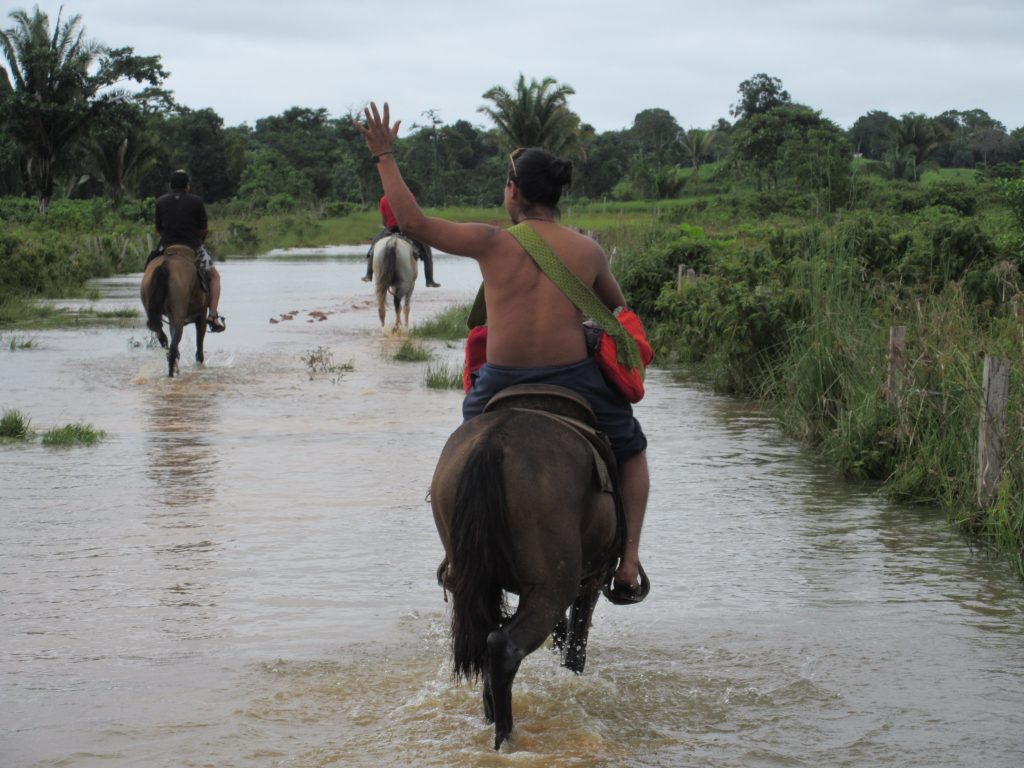
GSP activists ride horses into the community Chaab’il Ch’och’
In the 1930s, the community Chinamachacas (now known as Chaab’il Ch’och’), located in what is now the municipality of Livingston, department of Izabal, was created by hundreds of indigenous q’eqchi’ peasants fleeing extreme violence and slavery. At this time indigenous people in Guatemala were forced by law to either work on plantations or to work clearing roads and other infrastructure to facilitate the export of goods abroad. The largest landholder in Guatemala was the United Fruit Company, a US-based corporation. Other foreign private interests were looting indigenous communities throughout the q’eqchi’ territory of northeast Guatemala and converting them to coffee and other agro-export plantations.
Chinamachacas was located in the municipality of Livingston, department of Izabal, only a few feet above sea level and separated from urban areas by numerous rivers as well as the Gulf of Livingston. Because of the isolation and the fact that the area was consider uninhabitable by lighter skinned people, the community was able to continue to escape forced labor, and developed for decades based primarily on subsistence agriculture. The community extended for hundreds of acres and its people were among a minority of q’eqchi’ who were able to live outside the norm of forced labor on plantations. But residents of Chinamachacas were not able to escape the extending reach of capitalism, militarism and imperialism forever.
In 1944 a largely non-violent revolution overthrew US-backed dictator Jorge Ubico. Free elections were held for the first time, and the forced labor law for indigenous people was ended. The US used many methods to try to subvert Guatemalan democracy, and in 1954 the US Air Force bombed Guatemala City and installed a military dictatorship that in many ways has continued to this day.
Resistance to the military dictatorship was broad, and the US responded by increasing its direction and support of the Guatemalan military. Much of this violence was coordinated through the US Army School of the Americas, a US military school known for training dictators and leaders of massacres throughout the Western Hemisphere. This led to a three-decade long war in which the Guatemalan government intentionally targeted indigenous people, murdering hundreds of thousands of civilians in what the United Nations and many others have called acts of genocide. According to a 1997 UN Truth Commission the Guatemalan government used the US National Security Doctrine and US training and technology to torture and murder children, pregnant women and thousands of others as part of this genocide.
During the genocidal war, military officials stole enormous tracts of land from indigenous communities. For example General Romeo Lucas Garcia, a graduate of the US Army School of the Americas (SOA) and dictator of Guatemala from 1978 to 1982, became the owner of over 90,000 acres of land during his time as President. He is known for starting the “scorched earth policy” of massacring and burning down entire indigenous villages. He was followed by General Efrain Rios Montt, another SOA graduate who ruled Guatemala in 1982 to 1983 and continued the scorched earth policy. US President Ronald Reagan met with Montt in 1982 and said that he was “a man of great personal integrity” who was “totally dedicated to democracy.” In 2013 Montt was convicted of genocide and sentenced to 80 years in prison, although the conviction was later reversed by a corrupt judge.
In the 1970s this genocidal violence and systematic land theft reached Chinamachacas. Carlos Augusto Garavito Moran, a military official and graduate of the SOA, suddenly appeared in land registries as the owner of the area inhabited by the community. Residents remember how his family brought cattle into the community, destroying their crops. Those who objected were shot. Houses were burned and many fled the area while others were forced into labor. Garavito Moran is now in prison, convicted of forced disappearance and sexual violence in January, 2016.
In January 2012, General Otto Perez Molina, another graduate of the SOA, became President of Guatemala. During his Presidency he used government resources to convert part of Chinamachacas into a personal vacation spot, and according to numerous witnesses used the area for clandestine meetings with drug traffickers and other elicit activities. Molina’s Minister of Communications, Alejandro Sinibaldi, suddenly became legal owner of thousands of acres surrounding Chinamachacas.
Vacation home built in Chinamachacas for use by President Molina and his friends. Some of the furniture was labeled “UNICEF”
On September 3, 2015, President Molina was arrested after massive protests throughout the country and an investigation by the International Commission Against Impunity in Guatemala (CICIG). Molina remains behind bars on numerous charges of fraud and corruption. Sinibaldi is a fugitive of law wanted on related charges of fraud, but companies created by his accountant continue to be legal owners of much of the land surrounding Chinamachacas.
Shortly after Molina’s arrest, the community publicly announced that they were renaming Chinamachacas as Chaab’il Ch’och’ (meaning good or fertile land in Q’eqchi’) and that they were reclaiming ownership of the land. They reached out to national and international courts requesting an investigation into the previous violent theft of the land.
A large sign indicates the entrance to the community Chaab’il Ch’och’: “Lands recuperated from the hands of Otto Perez Molina… no more injustice against indigenous peoples”
GSP activists lead a drumming workshop in Chaab’il Ch’och’
In August of 2017, the International Commission Against Impunity in Guatemala (CICIG) attempted to move forward a corruption investigation against current Guatemalan President Jimmy Morales. Morales responded by announcing via Twitter the expulsion from Guatemala of Ivan Velasquez, head of CICIG. Hundreds of thousands of Guatemalans took to the streets calling for the President to step down. President Morales cancelled his order to expel Velasquez from the country, but has worked with congress to ensure his immunity from any charges.
On October 31, 2017, hundreds of police invaded Chaab’il Ch’och’. Without allowing community members to harvest their crops or even have sufficient time to gather their few possessions, police and employees of area plantations began burning homes to the ground. This provoked an immediate health crisis and children, pregnant and nursing mothers, the elderly and all other community members were left without sufficient food or shelter in the middle of Guatemala’s dangerous rainy season.
Burning of homes during the eviction of Chaab’il Ch’och’
Mother holds child during eviction of Chaab’il Ch’och’
November 1, 2017: Violent Eviction of La Cumbre Sa’kuxha
The indigenous people of La Cumbre Sa’kuxha, municipality of Tactic, department of Alta Verapaz, were forced to work for decades without pay, caring for livestock, planting and harvesting corn and other crops and doing whatever else was asked of them. Before 1944 they were legally required to do so. After 1944 they technically were not forced to do so, but once the US overthrew Guatemala’s young democracy in 1954 and started a brutal war there was no real option. Complaining about the lack of pay meant being labeled a subversive and being tortured or worse. Leaving the plantation meant risking pursuit by the genocidal military. Some did escape, only to be murdered. Others left and spent their days moving through the forests and jungles, constantly mobile to avoid the army. Some went to the city to live in desperate poverty.
La Cumbre Sa’kuxha elders discuss the community’s history during a GSP visit
When the war officially ended in the 1990s, community members wanted to take advantage of their supposed new rights. They organized and demanded that they be paid for their work. As a result, the homes of families who requested pay were burned down and they were kicked off the land.
Forced to disperse because of their extreme poverty, the community was still able to gather for regular meetings to discuss their legal rights. Under Guatemalan law, they had a right to access to land as a payment for their years of forced labor. They began to organize with the Committee of Peasant Unity (CUC), the organization most known internationally for its former member and Nobel Peace Prize winner Rigoberta Menchu.
Committee of Peasant Unity (CUC) Subcoordinator Maria Josefa Macz meets with community members in La Cumbre Sa’kuxha
For years they petitioned the government to recognize their rights, and the response was nothing. All the while they struggled against chronic malnutrition and extreme poverty. Finally they could wait no longer. On November 25, 2010, they reentered the land they were born on. With the support of CUC they publicized their return to the national and international press, demanding that the government recognize their right to their ancestral land. They slowly built the community up, largely escaping malnutrition and joining with other communities in calling for an end to systematic human rights violations against indigenous and peasant people. They had significant legal backing of their land claim, and it seemed that one day soon they may even have a school in the community.
La Cumbre Sa’kuxha before the eviction. These homes no longer exist.
GSP activists visit La Cumbre Sa’kuxha before the eviction
Then on September 4, 2017, community leader Rosendo Chen was arrested on charges of aggravated usurpation for supposedly “stealing land.” On the morning of November 1, 2017, hundreds of heavily armed police marched unannounced up the winding mountain path into the community. A judge accompanying the police stated that the community was going to be evicted. Community leaders declared their right to the land, but the authorities refused to listen. Riot police formed tight lines and marched toward the houses, preparing their tear gas canisters. Children ran away screaming and crying. Nursing mothers moved quickly to secure their babies and find safety.
By the end of the day, every home in the community was destroyed. The rain that started in the afternoon turned into a cold, heavy downpour that night. The terror from earlier in the day had been replaced by hunger, which was briefly replaced by cold as shivering families held tightly to each other trying in vain to stay warm.
Images from the violent eviction of La Cumbre Sa’kuxha
November 2 & 3, 2017: Postponed Evictions and the Violent Eviction of Se’muy
As word spread throughout Guatemala and the world of the violent evictions of Chaab’il Ch’och’ and La Cumbre Sa’kuxha, pressure grew on the government. The violence was part of an eviction order against 32 communities, and police were mobilizing to continue this large-scale displacement. The GSP collaborated with our partners on the ground, including a legal team that filed emergency appeals against the evictions. On November 2, a judge ruled that the remaining 30 eviction orders would be postponed until a further hearing. As is the case in many legal rulings, this was in part the result of legal arguments but also the result of public pressure. Although far from a complete victory, this was a major accomplishment that will give our partners and us time to mobilize and try to prevent these evictions from ever occurring.
Despite the important ruling on the 30 communities, other communities remain targets. On November 3, 2017, the q’eqchi’ community of Se’muy was violently attacked by police. Similar to La Cumbre Sa’kuxha, the people of Se’muy had worked for generations as forced labor on a plantation. After being violently evicted without back pay, they organized with the Committee of Peasant Unity. Nearly one year ago, they concentrated their houses in part of the plantation and demanded land rights as reparation for their years of servitude. Instead of recognizing their rights, the government responded on November 3 with arson.
Pictures from the eviction of Se’muy
Current State of Evicted Communities
Today, the people of Chaab’il Ch’och’, La Cumbre Sa’kuxha and Se’muy are in a desperate situation. Days after the evictions, the GSP and our allies brought supplies to the communities and found that many people, including children, hadn’t eaten since the violence. We have seen people die of starvation after violent evictions of other partner communities. Even those who survive, especially children, are very likely to face permanent health consequences as a result of extended extreme poverty. A growing number of children and elderly people from the communities are becoming sick.
The GSP is coordinating with our partners on the ground to bring food, medicine and other supplies to displaced people from these communities. The need is extremely urgent. The communities are also attempting to remain united. They are participating in a struggle for communal land rights, and they know that part of the government’s goal is to divide them and make their struggle impossible to continue.
Three pictures above: The GSP supported the collection of food and medicine during a recent visit to Guatemala City by representative from Chaab’il Ch’och’
Two pictures above: The GSP has supported the community La Cumbre Sa’kuxha with limited food,
medicine and makeshift shelter, but many children have become sick and the health crisis is worsening
Two pictures above: Se’muy receives aid from Committee of Peasant Unity communities in the Polochic Valley who were violently evicted in 2011.
After the 2011 evictions, numerous people suffered organ failure and some died of starvation.
15 Communities to be Evicted on November 15
As we continue to respond to the crisis in these three displaced communities, we have learned of a new eviction order against 15 indigenous communities set to take place on November 15, 2017. As always, “eviction” is expected to mean the burning down of entire villages and theft of crops and most belongings. We must mobilize now to prevent these evictions which would provoke massive suffering.
Picture taken during a GSP visit to the community Dolores
The q’eqchi’ community Dolores is among the communities threatened with eviction in the coming days. Families in the community worked as forced labor on the plantation they live on for generations, and refused to leave without being given backpay after their labor was no longer needed. They have organized with the Committee of Peasant Unity, and the GSP has collaborated with them with years, including supporting repairs to the roof of the community school.
Another community on the government list for eviction next week is Rio Cristalino, which neighbors Dolores in the municipality of Coban, department of Alta Verapaz. The GSP has worked with the community for nearly ten years. In 2006, hundreds of survivors of Guatemala’s genocide founded the community Rio Cristalino after their original homes were burned and lands stolen and they were left without food or basic possessions. The GSP helped the community build a school, and for a couple years we paid the teacher’s salary before finally successfully pressuring the government to accept its responsibility of sending a teacher to the community. This year, the government refused to send a teacher to the school, saying that the community does not have a right to exist. Now the government is preparing to burn down the entire community.
Picture taken earlier this year in Rio Cristalino as part of an effort to get the government to provide the community with a primary school teacher
Why Mass Violent Evictions, Why Now?
Many factors play a role in these evictions, including racism. During the Spanish invasion of Mayan territory in the 16th century, the Vatican officially declared indigenous people to be less than human. While the US and Guatemalan governments do not cite this as official policy, their actions make it clear that indigenous peoples continue to be considered as less than human.
Specific communities facing violent eviction this month are not being selected because their lands share one specific natural resource being targeted for theft or because one specific company is trying to take ownership of their territory. What they do share in common is that they are all well organized communities intentionally uniting with national movements struggling for democracy, indigenous rights and an end to environmental degradation, militarism and the looting of indigenous territory.
These movements have shown an incredible ability to win major victories in recent years, despite systematic repression. Some of the most important victories have been against Guatemana’s notorious impunity, in which authorities have been able to escape punishment for everything from corruption to genocide. Courageous organizing by indigenous and people’s movements in Guatemala have made it clear that even the most powerful are no longer safe from possible accountability. Two of the previous four presidents ended up in jail, and current President Jimmy Morales may be arrested soon as well. In January of 2016, 18 high ranking military officials were arrested for crimes against humanity, including Carlos Augusto Garavito Moran, who we mention above for his role in murdering community leaders and stealing land from Chaab’il Ch’och’ in the 1970s and 1980s. In February of 2016 two military officials were arrested for sexual enslavement, the first such conviction by any national court in world history.
Of equal importance have been victories defending indigenous territory from large scale resource exploitation. We stood with our partners to prevent the construction of the Xalala dam, a massive project that would have been larger than the Hoover Dam and would have flooded dozens of indigenous villages and devastated local ecosystems. We stood with our partners in November of 2016, when years of organizing finally led to a referendum in which 98% of voters in the municipality of San Carlos Alzatate, Jalapa, Guatemala, chose to prohibit any chemical mining activity within their municipal boundaries. The vote was particularly historic as the municipality neighbors the Escobal mine, which is the third largest silver mine in the world. Similar referendums are being organized throughout the country, and indigenous leaders are moving forward in the face of various forms of repression to defend Mother Earth.
While the current wave of violent evictions is motivated in large part by the desire to steal specific tracts of land, it may be motivated even more by a desire to weaken these growing movements for social and environmental justice. The President, military leaders and foreign investors realize that their genocidal rule is under serious threat. We will stand with our partners in this struggle and ask you to take action during this time of urgent crisis for a growing number of children, pregnant and nursing mothers, elderly and others.
On November 7, 2017, protestors blocked roads throughout the country demanding the resignation of President Jimmy Morales and more than 100 members of Congress
On November 8, 2017, q’eqchi’ communities marched in Guatemala City against violent evictions and the destruction of rivers in q’eqchi’ territory
We have successfully collaborated with our partners to stop planned evictions in the past, and we can do so again. Please join with us! Some suggested actions are listed below.
Take Action!
Suggested actions:
1) If you are a US citizen, please email or better yet call your member of congress and ask them to communicate their concern to the government of Guatemala. The Guatemalan government receives hundreds of millions of dollars in aid from the US and pays close attention to the concerns of members of congress. If you do make this contact please also contact us at info@guatemalasolidarityproject.org to let us know who you contacted and what their response was. Our partners want to meet with members of congress when they visit in March/April, and these contacts can help make that happen. It is easy to find your member of congress’ email by searching google, and even easier to call them via the congressional switchboard at 202-224-3121. Please take this action now or before November 15.
Example script:
“Hello my name is _____ and I am a constituent. I am calling out of great concern about the violent evictions of indigenous Mayan communities in Guatemala in recent weeks. This government violence has caused a completely unnecessary hunger crisis. The communities being evicted have an ancestral right to their land, and worse yet the government has ordered the violent evictions of many more communities in the coming days. I know that the US government provides millions of dollars in aid to Guatemala, including the training of soldiers and police. I would like to ask my member of congress to express their great concern about this violence against indigenous communities to the Guatemalan government and ask if US purchased funds, equipment or US trained personnel are being used in these violent evictions. Some of the communities that have been evicted include, and I will spell them for you, Chaab’il Ch’och’ in the department of Livingston and La Cumbre Sa’kuxha in the department of Alta Verapaz. Please let me know what action my member of congress takes. Thank you.”
2) Donate $10 (or more) Because we are a volunteer-run organization and all donations go to our partners, small donations can make a big impact. Please consider making a donation of of any size so that we can help bring food and basic support to evicted community members, especially children. Of course larger donations are wonderful, but even small donations can make a significant impact.
3) Support the upcoming GSP speaking tour in the US. In March/April 2018, the GSP is organizing a speaking tour featuring an indigenous woman activist and a Guatemalan lawyer who has worked on key cases involving government repression. If you or your institution is interested in hosting or sponsoring an event, please contact us at info@guatemalasolidarityproject.org
4) Join us in Guatemala. The GSP is looking for teachers, students, organizers, activists, farmers, musicians and others to join us in Guatemala in the coming months. We have several upcoming opportunities in which we will be visiting partner communities and inviting others to join and help document and denounce human rights violations, build personal and institutional relationships, facilitate safe meeting spaces and create concrete action plans aimed at advancing our partners’ struggles. Requirement usually includes traveling with us in Guatemala for 7-10 days although in some cases it is less and in some is more. Click here for examples of previous experiences. If you are interested in joining us and our partners on the ground please email us at info@guatemalasolidarityproject.org and let us know a little about you, your interests and your availability.
5) Join our urgent action email list to receive updates and participate in ongoing actions. To join our urgent action list email info@guatemalasolidarityproject.org with “Add to urgent action list” in the subject line, and we will let you know of important actions to take immediately after emergencies such as the arrest of a community leader or an attack on a community.
